#[ but /that/ plays so well into all these other very human elements that she has. ]
Text
Me: Talks about the significance and intimacy (not automatically romantic, folks, but also there's an inherent romanticism) of hands, and touch and who you let into that space of comfort.
Pinterest: Did you say hands? Here, we've adjusted your home feed you so that you. cannot. possibly. escape. them. you're. welcome.
Me: I just wanted— what did I want, again?
... Did I end up rambling about anything but hands in my tags? Yes. Welcome to me, this is what you sign up for. Not my portrayal, not my writing, my tag rambles.
#[ ooc. ] don't try to make it logical or edit your soul according to the fashion. rather; follow your most intense obsessions mercilessly.#[ i literally don't remember what i went on here for. ]#[ i thought it was an icon but it was not. ]#[ instead i'm now thinking of the importance of her gloves. ]#[ and how they're a barrier between her and humanity. or everything inherently human; more so. ]#[ they're an aesthetic. yes. of course-- but it's more than that. in characters made by hoyo? everything always has 5 more layers. ]#[ at the very least. ]#[ ugh. i wish i could organize my thoughts and talk about the 'versions' of rather-- layers of kafka herself. ]#[ without it being 24 paragraphs long. ]#[ it's just gotten so complicated because you see her presenting herself in such way for so long. ]#[ voice. attitude. indifference. playfulness. and all of those remain except they falter more when she's around two individuals. ]#[ i can't even include sw and elio in this yet. because while kafka seemed to lean a little towards her more normal voice... ]#[ in the pier point dialogue with sw; it was only sometimes. it was so inconsistent. ]#[ same with sam. granted there's only one exchange between them so far. ]#[ but i digress-- then i get her story quest and in it she softens not even a little. but decently enough. ]#[ is /that/ the pretense? no you don't fake that. you don't fake how she says '...you're not leaving?' that delivery is vocal perfection. ]#[ but /that/ plays so well into all these other very human elements that she has. ]#[ i swear-- part of me truly believes she's already /on/ the path of 'learning' to feel a semblance of what fear is. or better yet... ]#[ what it /stems/ from. ]#[ because we say 'she has no concept of fear' but what does that MEAN. does that mean across the board? ]#[ concern stems from fear. you need /care/ and investment to feel fear. she /shows/ concern actively. she risks a lot to-- ]#[ be concerned about blade. and yes; she lacks the fear of them getting caught. but she's concerned for him. ]#[ and she's also practical and analytical; she knows if they get caught-- blade worsens. ]#[ and while it also endangers the 'future' a bit; she harps on blade. she also confides in the MC about her concern. ]#[ i just. ]#[ this is so much more complicated than i thought it'd be. ]#[ and also this whole concept of what humans fall into when they lack fear. how they become metaphorical 'demons'... ]#[ that pursue pleasure and thrill. but she became a /hunter/ of them. and yet she shows a lesser shade of it herself. ]#[ i just. think she's so inherently and stupidly interesting. HI GUYS. HANDS. i totally went on a tangent. ]#[ ... not about hands. ]
8 notes
·
View notes
Text
one of my favorite things about mdzs is that for how heavily its plot involves politics of classism and misogyny... even the characters most directly impacted by it can't and don't free themselves from it. literally the closest exception is mianmian.
meng yao being the "son of a whore" wasn't some sort of commie awakening for him that led him to wanting everyone to be socially equal. he played the political game, climbed the ladders, sucked up to and backstabbed and murdered people, including other prostitutes who actually had nothing to do with how he and his mother were treated at the brothel he grew up in.
he put in so much extra excessive effort for even a fraction of the same respect that members of gentry cultivation clans got. and he did deserve to be treated more humanely! but he feeds into the exact same system that created him, leading to his own undoing.
his efforts were for a fragile upward mobility that was never going to hold up. he never surpassed his origins nor did he empower others in similar stations, because the society he lives in is not one that would accept that.
the second he got caught and all those crimes exposed, he was scapegoated to hell and back, replacing wei wuxian as society's terrible one-sidedly evil boogeyman overnight.
speaking of not-quite male gentry, i think it's interesting that wei wuxian explicitly doesn't try to climb the ladders in BOTH lives, knowing full well that anything he does will be punished just for the sheer fact that he is wei wuxian.
wei wuxian is scolded for giving intelligent and correct answers in school. lan wangji does the same and is praised.
wei wuxian occasionally lounges around with fellow disciples and is punished. jiang cheng does the same and mostly escapes.
wei wuxian refuses to carry his sword around in public (after losing his golden core, which nobody knows) and is scorned as an arrogant upstart. nie huaisang has been doing the EXACT SAME THING for YEARS and nobody bats an eye.
unlike jin guangyao, wei wuxian knew subconsciously from the start that his acceptance was superficial and that he could be cast out any time. when he was 10 and recently taken in by the jiangs, he canonically would not eat or use "too much" food and water because he thought they'd find him a nuisance for "wasting their things" and kick him back out.
now away from just the classism, yu ziyuan is a proud and strong noblewoman in a society that belittles and derides women for everything they do. her strong cultivation doesn't matter. she's victim to the vicious rumors of her husband loving another woman who is strong like her but apparently had a more likeable personality.
it doesn't matter even if jiang fengmian didn't cheat or that wei wuxian is wei changze's son with cangse sanren; yu ziyuan can't bear with the humiliation of herself (and by extension her children) not being "good enough". she's ridiculed for "failing" in that one duty as a wife, mother, and woman.
she lashes out and takes out that anger on everyone present for years, giving her children lasting trauma and also being a key element in how the jiang family and yunmeng jiang sect are effectively wiped out at the hands of the wen clan.
madam jin doesn't even have a name outside of the fact that she's married to jin guangshan. i don't even remember reading anything that indicates if she's a strong or weak cultivator, or what, which in itself proves that to most people, it doesn't matter. she's "just" a woman.
of course she's angry at her husband's affairs and all the bastard children they bring in. but she also can't do anything about them, so she lashes out at the few people she can: servants. non-cultivators, probably. those very same bastard children.
shoutout to meng yao getting shoved down a flight of stairs at age fourteen, because if madam jin tried that move against her husband instead, it would make her lose even more face, which as a noblewoman she'd never do.
and that's not getting into how jiang yanli is consistently sidelined for being physically weak.
that's not getting into how mianmian was actually a good cultivator, but was mocked by everyone around her for trying to stand up for wei wuxian when everyone was turning on him. how everyone scoffed at luo qingyang's words as "just some lovesick woman" who "obviously wants to marry or bed him since he saved her".
luo qingyang is the only one of these characters who HASN'T died. she didn't play society's games like jin guangyao. she didn't dig her heels in confidence of her own abilities like wei wuxian.
she didn't bitterly lash out like yu ziyuan and madam jin. she didn't gently accept it like jiang yanli.
she just LEFT.
she married an ordinary merchant and cultivates separately from mainstream cultivation society, and therein found her own peace and happiness.
mxtx doesn't bother with particularly class conscious or feminist vocabulary to hand-hold readers into understanding these disparities, but that choice highlights them & the deeply entrenched politics of their society even more. i really love it.
#keri chats#mdzs#mo dao zu shi#long post#mdzs spoilers#im novel only but still tagging.#the untamed#cql#yeah yeah everyone's written meta addressing this aspect of the story BUT I THINK ABOUT IT ALL THE TIMEEEEE#maybe i just don't get to read a ton of books often; esp not ones that mirror my own culture. but it's just so. soooooo. augh#the fact that the setting itself enables so much of the tragedy in mdzs... which is true of all tragedies but STILL...#this isn't even getting into qin su and the power imbalance w her and jgy post-reveal... man.#man. so much going on here. man#THIS POST IS MESSY AND BARELY EDITED BUT IF U READ IT. ILU
502 notes
·
View notes
Note
from a non-academic, i find parts of comphet to be useful (heterosexuality becomes compulsory when you’re raised in a heterosexual society) but the foundations . suck. what do we do with theories like this, that have touched on a truth but also carry a lot of garbage? can we separate the truth from the founder?
i have to be slightly pedantic and say that i don't think rich's essay is an example of this phenomenon. my central issue with her formulation is its bioessentialist assumptions about human sex and therefore also sexuality. if i say "capitalism includes economic mechanisms that enforce heterosexual behaviour and exclude other possibilities", then what i mean by "heterosexual" is plainly not the same as what rich means—and for this reason i would seldom formulate the statement this way, without clarifying that i am talking about the enforcement of heterosexuality as a part of the creation and defence of sex/gender categories themselves. so rich and i do not actually agree on the very fundamental premises of this paper! rich was not the first or only person to point out that economic mechanisms as well as resultant social norms enforce heterosexual pairings; i actually don't even think the essay does a very clear job of interrogating the relationship between labour, economy, and the creation of sex/gender; she means something different and essentialist to what i mean by sex and sexuality; and i think her proposed responses to the phenomenon she identifies as 'compulsory heterosexuality' are uninteresting because they mainly propose psychological answers to a problem arising from conditions of political economy. so, in regards to this specific paper, i am actually totally comfortable just saying that it's not a useful formulation, and i don't feel a need to rescue elements of it.
in general, i do know what you're talking about, and i think there's a false dichotomy here: as though we must either discard an idea entirely if it has elements we dislike, or we accept it on the condition that we can plausibly claim these elements and their author are irrelevant. these are not comprehensive options. instead, i would posit that every theory, hypothesis, or idea is laden with context, including values held and assumptions made by their progenitors. the point is not to find a mythical 'objective' truth unburdened by human bias or mistakes; this is impossible. instead, i think we need to take seriously the elements of an idea that we object to. why are they there? what sorts of assumptions or arguments motivate them, and are those actually separable from whatever we like in the idea? if so, can we be clear about which aspects of the theory are still useful or applicable, and where it is that the objectionable elements arise? and if we can identify these points, then what might we propose instead? this is all much more useful, imo, than either waiting for a perfect morally unimpeachable theory or trying to 'accept' a theory without grappling with its origins (political, social, intellectual).
a recent example that you might find interesting as a kind of case study is j lorand matory's book the fetish revisited, which argues that the 'fetish' concept in freud's and marx's work drew from their respective understandings of afro-atlantic gods. in other words, when marx said capitalists "fetishise" commodities or freud spoke about sexual "fetishism", they were each claiming that viewing an object as agentive, meaning-laden in itself (ie, devoid of the context of human meaning-making as a social and political activity) was comparable to 'primitive' and delusory religious practices.
matory's point here isn't that we should reject marx's entire contribution to political economy because he was racist, nor is it that we can somehow accept parts of what marx said by just excising any racist bits. rather, matory asks us to grapple seriously with the role that marx's anthropologically inflected racism plays in his ideas, and what limitations it imposes on them. why is it that marx could identify the commodity as being discursively abstracted and 'fetishised', but did not apply this understanding to other ideas and objects in a consistent way? and how is his understanding of this process of 'fetishisation' shaped by his beliefs about afro-atlantic peoples, and their 'intelligence' or civilisational achievements in comparison to northwestern europeans'? by this critique matory is able to nuance the fetish concept, and to argue that marx's formulation of it was both reductive and inconsistently applied (analogously to how freud viewed only some sexuality as 'fetishistic'). it is true in some sense that capital and the commodity are reified and abstracted in a manner comparable to the creation of a metaphysical entity, but what we get from matory is both a better, more nuanced understanding of this process of meaning-making (incl. a challenge to the racist idea of afro-atlantic gods as simply a result of inferior intelligence or cultural development), and the critical point that if this is fetishism, then we must understand a lot more human discourse and activity as hinging on fetishisation.
the answer of what we do with the shitty or poorly formulated parts of a theory won't always be the same, obviously; this is a dialogue we probably need to have (and then have again) every time we evaluate an idea or theory. but i hope this gives you some jumping-off points to consider, and an idea of what it might look like to grapple with ideas as things inherently shaped by people—and our biases and assumptions and failings—without assuming that means we can or should just discard them any time those failings show through. the point is not to waste time trying to find something objective, but to understand the subjective in its context and with its strengths and limitations, and then to decide from there what use we can or should make of it.
541 notes
·
View notes
Note
i never realised just how much tgb had changed how i thought about the characters (mostly vee) until yesterday when i was re-looking over my toh fan-art. You wrote them so well that i forgot that it wasnt all in the show. like how vee and gus weren't shown to being best friends, vee never got to be angry/shocked by hunter or just willow still holding a little grudge against amity. They are just cool details and im so clad they were added! ps your great
Thank you! Wow that's very flattering! I'm glad you are enjoying it!

I really like Vee, and the more I think about the gang's time in the human-realm, the more I sit back in my chair and think "Ah man, these arcs are really necessary and interesting though.."
Vee also holds a lot of plot, as a basilisk. We can speculate what the reason is that they were extinct, for example (grimwalkers were extinct too).
Wat I really enjoy about TOH's characters are how easily and smoothly they weave into each other's themes and arcs. Their personalities and histories makes them all perfect friends to both build them up and break them down. It's a chefs kiss.
Vee is no different! The set-up for her character was perfectly slotted in to what the other characters needed for their time in the human-realm. And the theme I think the human-realm was supposed to embody.
The demon-realm arc for Luz was a hero's journey, but because of the foil of the trope, and that the point was that: there is no hero/chosen one actually, and the rebels didn't make it in time like in the books, and just because it's a different realm it didn't mean Luz could escape - escapism is temporary.
Dana has said grief and hope are core elements of the story, and she chose to tell it through a foiled trope of being chosen/hero's journey, layered with a religious trauma lens.
To me, looking at Luz as the main character, means looking at her as a nerdy girl in need of escapism, wanting to find purpose, and avoiding her emotions about her dad's passing.
The return to human-realm would be, for Luz, a turning point where TOH turns from being about a hero's journey and a journey about the steps of grief and healing - at the end of it, she will find the light.
Vee, to me, is kind of like a new take on the guide character. She is not a guide, in the sense that she has all the answers, but rather all the truths.
She was right when she told Luz she had everything and still chose to run away. They're not the same. Vee is also a lot better than Luz at being normal and fitting in, something Luz has been playing off and avoiding facing.
Luz sees herself as being different as a bad thing, she tried to run away to a place where "weird" was normal and that didn't work out. Now she's back home and feels that it's all her fault bad things happened, because she is herself. And the person she is is different. And different didn't mean special, just different. Of course she's depressed.
The same is true for all the other characters. Vee gets to reflect their truths too, simply by being crafted, narratively, into being the guide.
Hunter gets to face his actions as the GG, come to terms with the nuances of his bad actions, whatever reason he committed what he did. Find forgiveness not just from Vee but himself too. He gets to start over, just like her. She shows him it's possible.
Gus gets someone to share his dream with, his love and enthusiasm for the human realm. A place that Vee feels is more home than where she came from. Gus gets to grow as a person, both morally and intelligently. As does Vee, she gets somebody who shows her that she doesn't just have to be a refugee, she can have a purpose here. She can be an ambassador.
Willow was set up to have an arc where she mistook her newfound magical and physical strengths (she is working out a lot in canon after she changed track), for inner strengths. Willow is a sensitive girl, and a bit of a berserk (I mean she was willing to burn her own mind just to hurt Amity).
Willow having to face Vee, who isn't physically stronger than her but is significantly further down the road of being internally strong, is something Willow can learn from. Perhaps even have conflict with! (but more so a conflict with herself than with Vee, really.)
With Amity, Vee has a simpler role. I think to Amity it's more so showing that it's possible to live in the human realm, and giving her hope that going back and forth is a future for everyone who wishes to do so. Creatively speaking, I think Amity and Vee more so to bounce off one another for the plot, rather than character growth or decline.
Camila, I think, is the most interesting. Because she has now spent approximately a year with Vee, half of it thinking she was Luz and having feelings about her daughter having changed so much, the line "I'm glad youre still creative" comes to mind. As well as the terror of losing Luz again.
But also, because she has had her own unseen arc and development with Vee, and them having bonded into a foster family that we never got to see glimpses of, it goes without saying that Camila has already done the internal work to take on more kids if that's necessary. I think she saw these kids by her door and thought "yep. They're mine now too."
Vee, I think, is interesting to toss into the family dynamic between Luz and Camila, who seemingly are misunderstanding one another significantly. Vee sees them both, and can be a voice of reason when it comes to it. Or if it would come to it.
ANYWAY MY RANTS ARE LONG. IM DONE. THANKS FOR READING.
420 notes
·
View notes
Text
Dream and How He Experiences Love
(Or: When the Unreal is at War with the Real, and Finally Understanding Unconditional Love Tightens the Noose Around Your Neck That Has Been There All Along)
And as always: Send me asks about everything Sandman-related!
Let me start this one with a few adjectives from the horse’s mouth (aka: Neil Gaiman said so 🤣) as to what Dream is actually like:
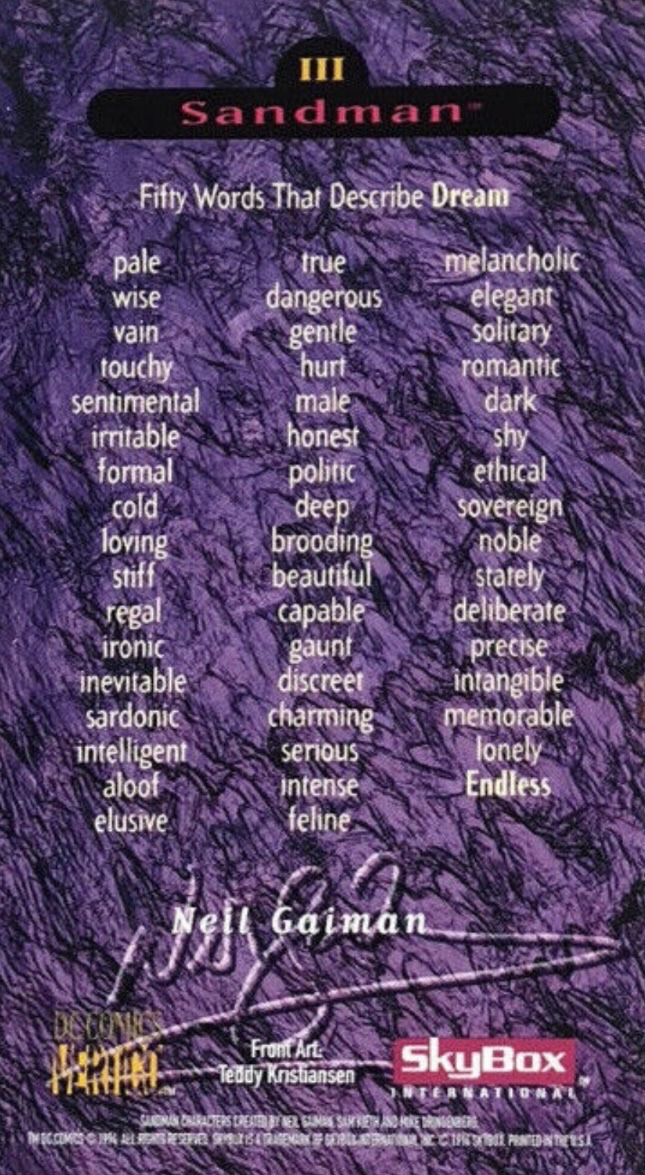
from: Vertigo Chase Card Set
So in short: This is probably the most accurate way to describe Dream in a nutshell, from the author himself, fully knowing that Murphy doesn’t lend himself well to be described in a nutshell.
And of course it’s absolutely fine if we want to head-canon him just being 5 out of those 50 (or none of them at all)—our stories are our own. At the end of the day, we went through a whole year of Tumblrfication (I might have made up that word), and getting back to the series will be tough. So is trying to align what the current prevalent perception of Dream is like in parts of the fandom, and what he is like in both comics and series (show and comics really aren’t that different where it matters, and I’ll die on that hill). I already worry about the fallout if I look at what happened with GO or OFMD, but that just as an aside.
Anyway, Dream in fandom spaces is often portrayed as either a pathetic wet cat who can’t get to grips with anything and constantly needs rescued in one way or another, or as a completely unfeeling arsehole incapable of relating to the human experience and being horrible all around. There are very few shades of grey in how some fans perceive him, when just the list of above adjectives shows us how complex he is as a character.
One thing that obviously comes up regularly are his relationships, be they romantic or platonic. So I just wanted to draw attention to the adjectives that relate strongly to the relational element in him (although they all apply in one way or another):
touchy, sentimental, cold, loving, [elusive], gentle, hurt, deep, intense, solitary, romantic, shy, intangible, lonely
Dream is the unreal. His way of loving relates very deeply to what stereotypical romantic love is: Romance and reality are a contradiction in terms—romanticism is dreaming because it is, at its very core, an idealised view. The intangible dream that comes back to bite us in the arse once reality sets in. And his flavour of love is the prototype of idealised and intangible (=romantic) and can never be anything else by his very nature.
And I’ve often thought that the way he experiences love is also a large part of why his existence is so difficult for him, and why he ultimately makes the choices he makes. Yes, he detests his function, but if he weren't so lonely (and weren't doomed to be so by his very purpose), he might find it easier to bear.
Let me look at, and draw parallels to, the 7 types of love as the Ancient Greeks perceived them [quick note about the image references: I would have loved to give more, but there is a limit. Also: Apologies I have no alt text for the comic panels at this point, I might add them at a later stage if I find the time]…
Eros
That’s both sexual and romantic love (to varying degrees), and it can be fleeting (like a dream) if not anchored in a less idealised view. So there’s your first cue—he totally experiences that kind of love.
The Ancient Greeks also thought it was a dangerous type of love, one that clouds our judgment and one that won’t last if not combined with some of the other types. And Dream himself knows this and probably relates (he detests his sibling Desire for “meddling”, after all). And yet, he is the intangible, the ungrounded, the unreal.
It’s all over every single one of his relationships we witness:
Killalla—“gifted” by Desire. We never get any cue as to what exactly they were up to, but it can be assumed desire, for whatever, played a large part in their relationship. Killalla makes no secret about it either (and is at the same time uncertain whether she truly loves him while being confused Dream might actually love her after what seems a very short time, at least in cosmic terms). Suffice it to say, he has a very idealised view of her and their relationship. Romantic idiocy at its best: He has literal stars in his eyes and is so grateful for Desire’s help he is basically kissing their boots in gratitude.
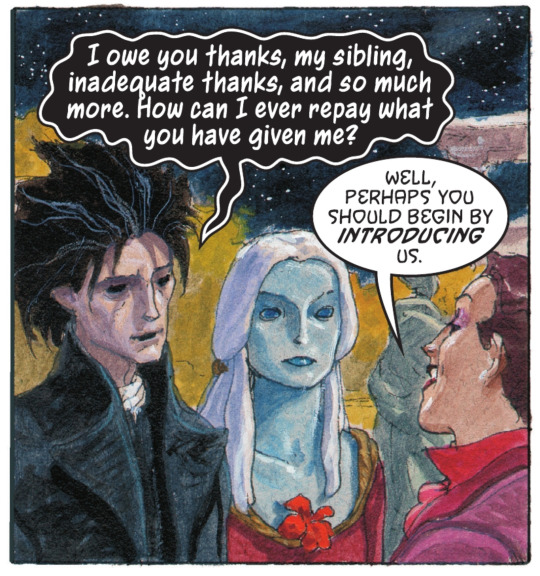
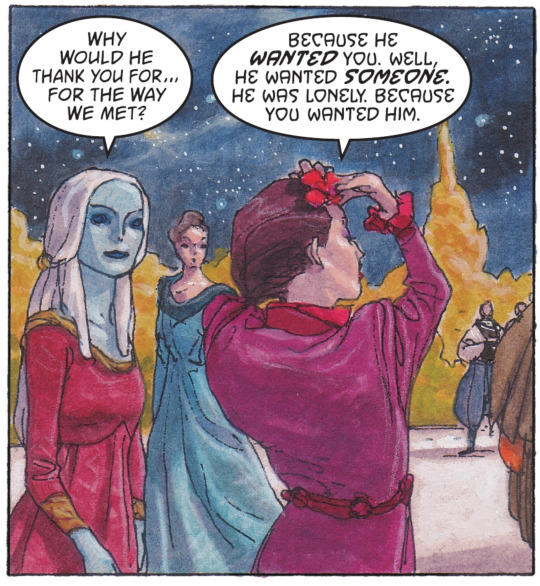
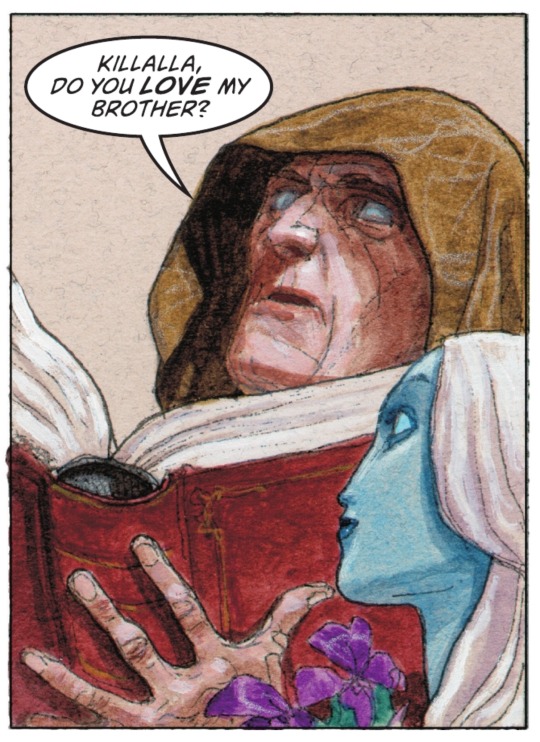
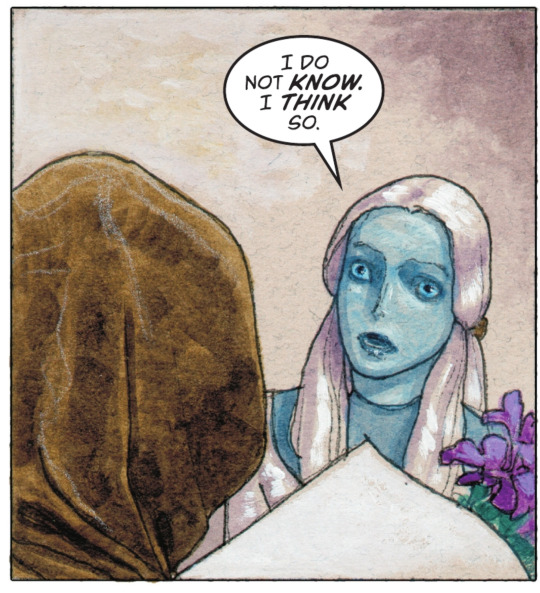
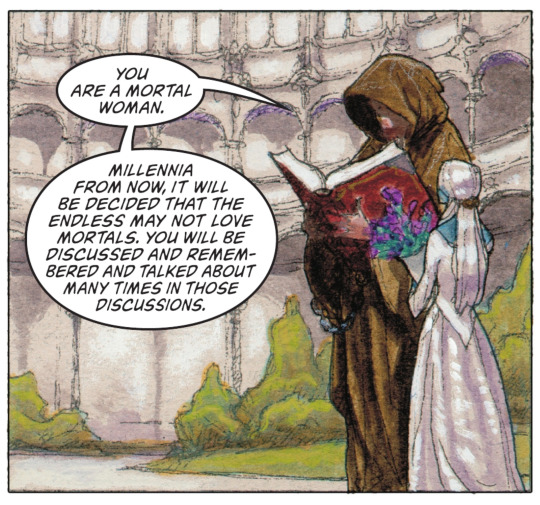
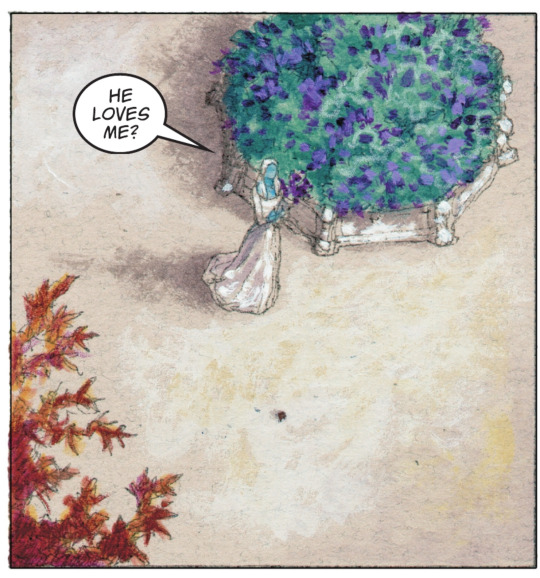
Alianora—again one of Desire’s gifts. And Dream tried, and I definitely think he was at least romantically (and physically) attracted to her (the art is very hard to interpret otherwise, neither is the context--she was gifted by Desire, after all). But this relationship is generally a tricky one because there is gratefulness and guilt n the mix, and that is sometimes a very unfortunate combination. He also couldn’t fully trust her because of his deep mistrust of D/desire. And lo and behold, of course the relationship soured when romantic and (potentially physical) attraction waned.
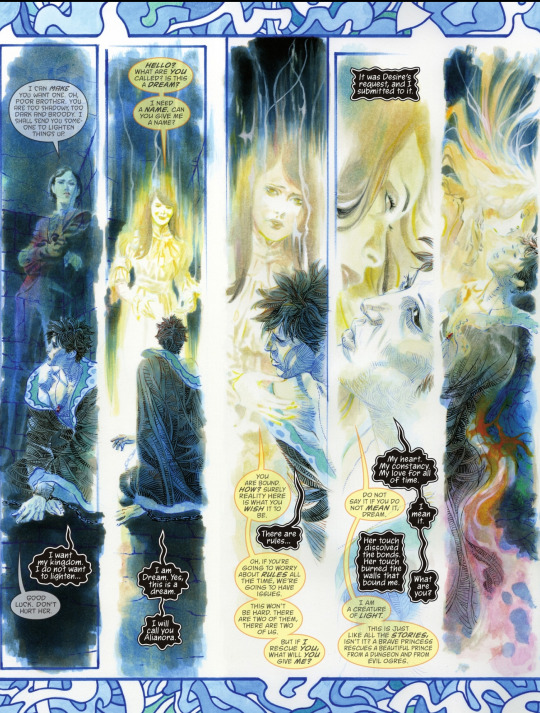
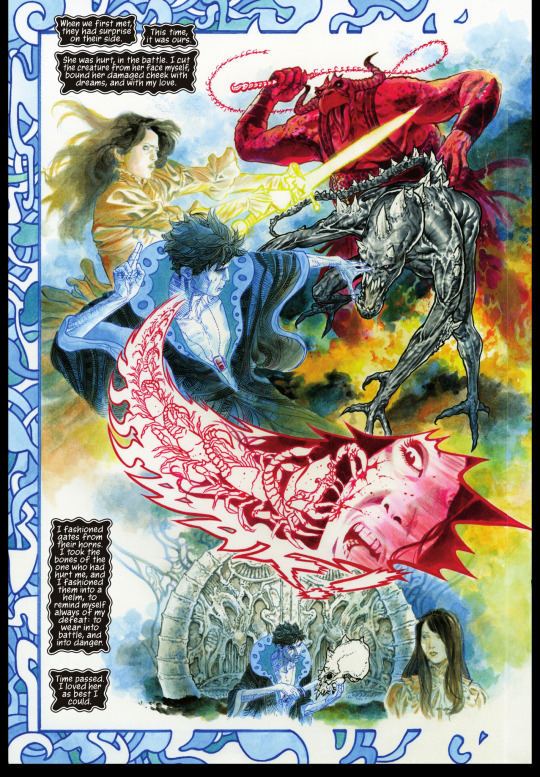

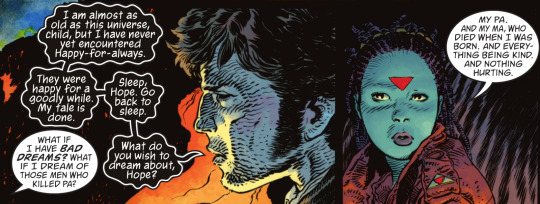
Nada—pursuing each other on and off, broadcasting sexy time all over the Dreaming because he's just so head over heels and literally bursting at the seams—need I say more? Yes, he does say to her that her body does not matter to him, which I 100% believe is true. He also says that he will love her as no mortal man can. But everything that transpires is still deeply informed by romantic attraction, because quite frankly: You don't feel love yet after you've barely met someone. It's again a deeply idealised view and that is something inherently romantic in tandem (in this case) with physical desire. Again, because D/desire was involved.
As to the particulars of Nada’s banishment to hell, and why Dream acted so out of character compared to his other failed relationships: You can find all of it here.
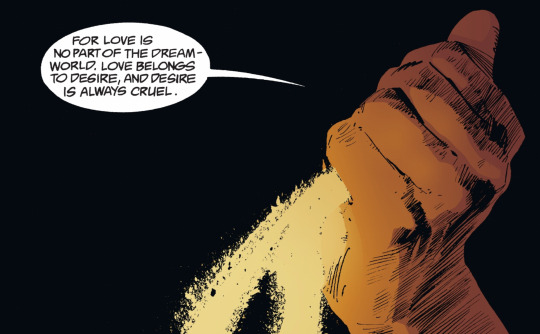
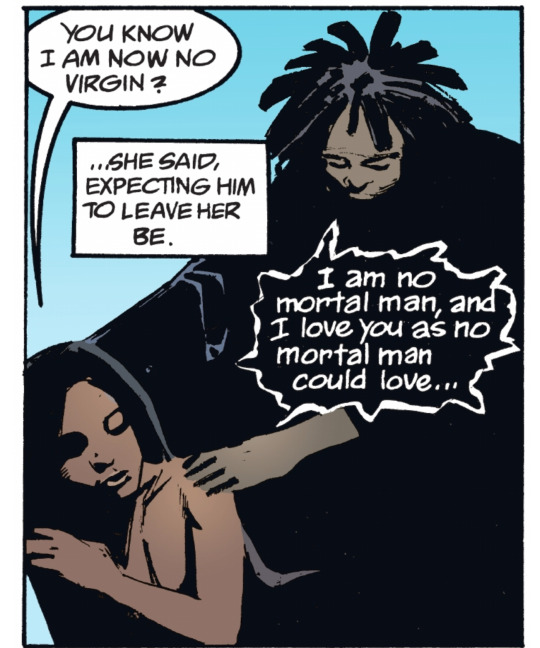
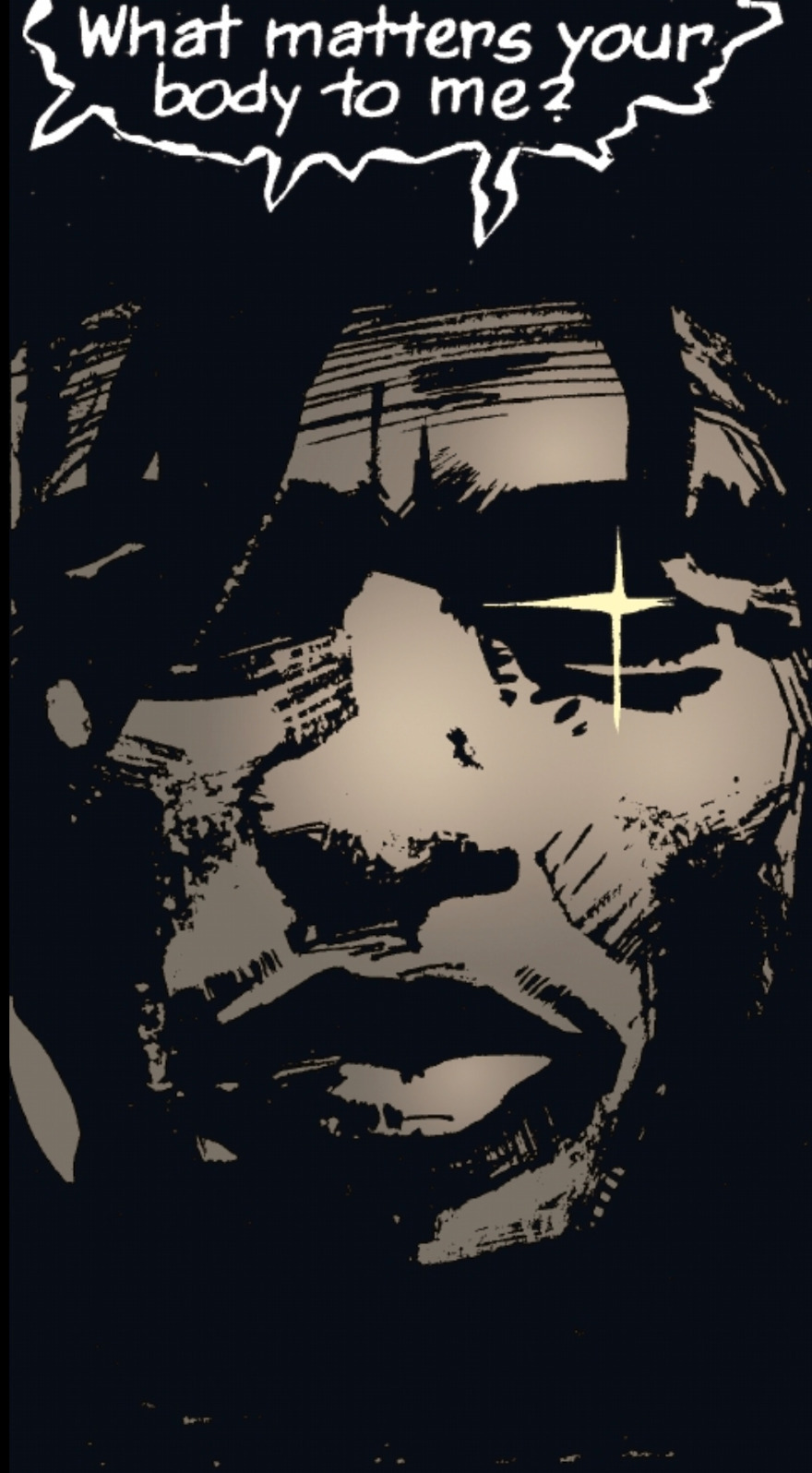
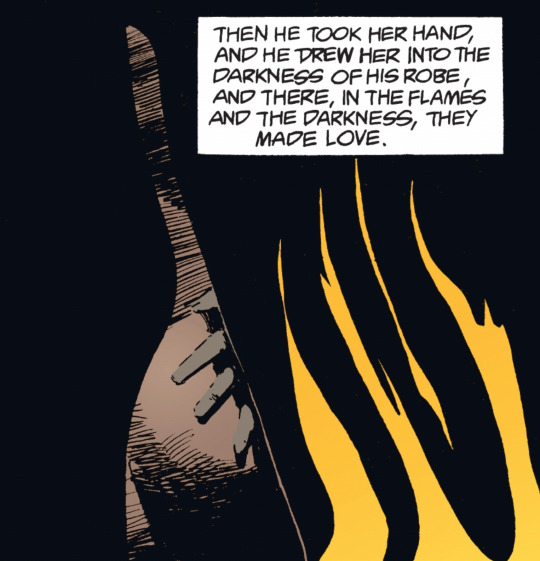
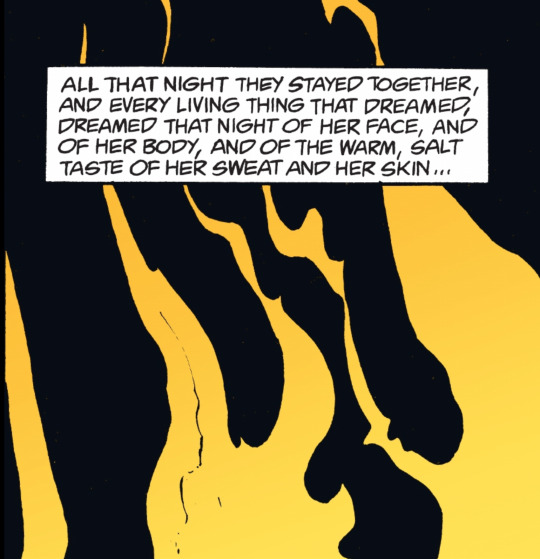
Calliope—read her speech at the Wake is all I’ll say. That is someone making romantic love so integral to their whole existence, I don’t even know where to start. He puts the world at her feet and makes sure she always comes first (quite literally) while they are still loved up…
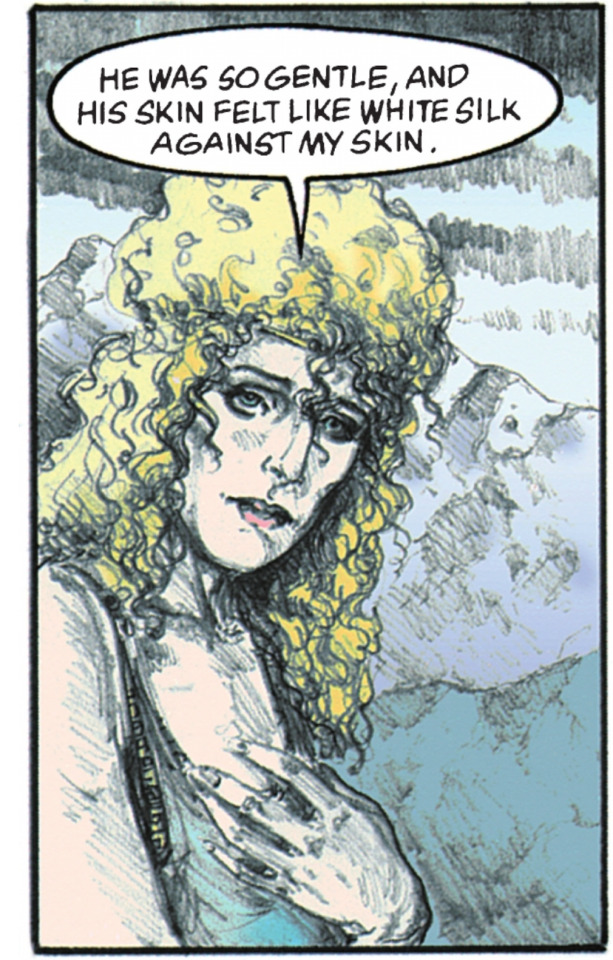
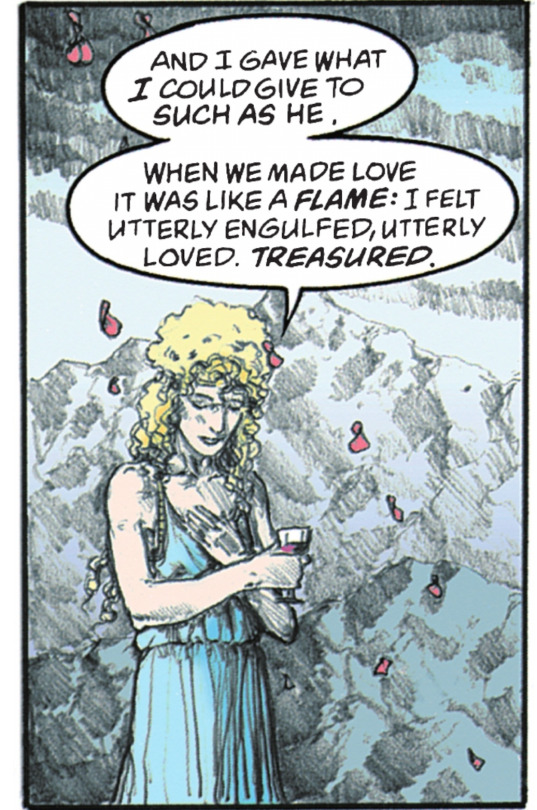
Thessaly—he's the romantic idiot (affectionately) in the rain with his coat billowing in the wind, and referring to her “weighing him dispassionately and finding him wanting”. It was only a handful of months--you don't feel true, stable love at that point. Again, it has the idealised view of romance (and potentially sexual desire) written all over it. He would have given her the world, just like he would have given the world to Nada and Calliope. That is the trope of every freaking romance novel, and that is exactly how he perceives love.
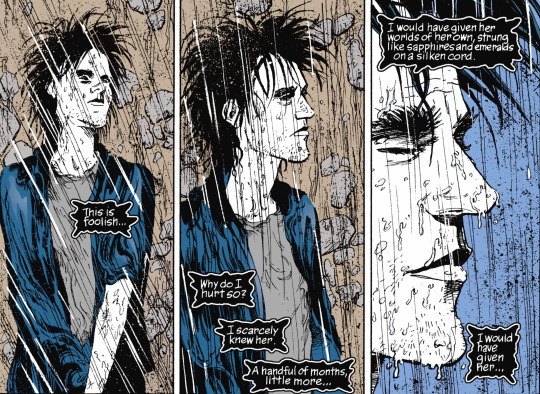
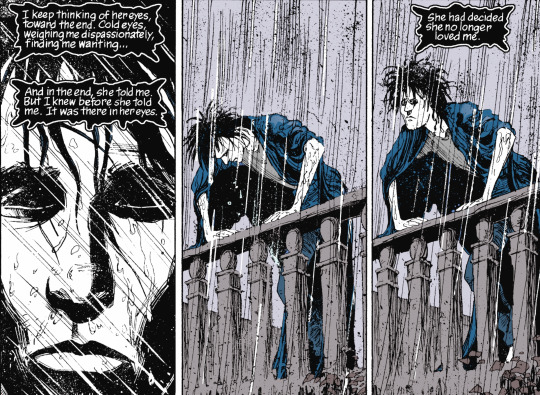
Titania—who knows, she keeps her mouth shut.
Ludus
I think he has a hard time to be flirtatious and playful (at least, we don't really see it. We never really see him during the courting stage, and what went down with Thessaly was hardly "flirtatious". `Then again, bickering like they did in A Game of You is electrifying to some, so who knows. She also said at his wake he was cautious and nervous). And if he comes across as flirtatious (there is a charming on that list of adjectives after all), it’s just because he is so deliberate in everything he does that he might just push someone’s (right) buttons, so to speak. But that’s not the same as “no strings attached”-love, because I honestly believe he’s incapable of experiencing love that way. There is no “casual” with him. He always stays attached to the people/women he once loved, even if the relationship sours. He still loves each and every single one of them, he never stops. But he also doesn’t in a way that’s sustainable, and it’s an unsolvable conflict due to what/who he is.
Philia
Most closely translated as friendship and affection. Platonic love, if you will. It is also a love between equals. He has a hard time with it and only slowly learns what it means through his relationship with Hob. Needless to say: The Ancient Greeks valued platonic love as one of the highest forms of love. Hence, I’m personally reluctant to turn it into something else/slant it towards romance, because that’s exactly what this part of the story is about: His relationship to Hob is important and grows/lasts because it is not romantic in the comics.
Storge
Unconditional love for family, especially children. Based on complete acceptance and potentially sacrifice. Doesn’t need to be reciprocated. You feel it, no matter what, and you act accordingly. And for Dream and Orpheus, that didn’t work until it did. Or, let’s rather say: I don’t want to assume he didn’t feel it. But he pushed it down in his hurt and pride (as did his son in his grief). No further comment, because that one hurts.
Agape
Altruistic, universal, all-encompassing. And that’s so deeply at the core of his being, and so central to his whole conflict that I don’t even know where to start. From not wanting to kill the first vortex (or Rose, for that matter), to telling John Dee he’s hurting the dreamers, and that being his main concern while he himself was writhing on the floor in agony, to “humanity I love you”, to a million other things. He cares so deeply, there is such a deep concern for sentient beings in their entirety that it’s quite literally impossible to call it anything other than love. And it’s also what plays a large part in his demise.
Pragma
Oh, here we go. I honestly believe he likes the idea of committed and long-lasting. And he’s trying. So very hard. Calliope is the best example. Alianora was another one, because it’s not like they broke up swiftly (hard to tell how long they lasted, but since she had stayed in the Dreaming too long to go anywhere else, it wouldn’t surprise me if we’re actually talking a very, very long time. He called it “a goodly while”, and considering how old he is, I doubt that equals only months, or even just a few years, especially since he is fully aware how short his relationship to Thessaly was). And he wanted to stay true to his promise. But he is who/what he is: the unreal. And as the personification of that, love both feels real for him but will also forever stay intangible. It’s heartbreaking really. Again, it has written the contradiction between romantic love (the ideal) and pragmatic love (the thing that is grounded in reality) written all over it.
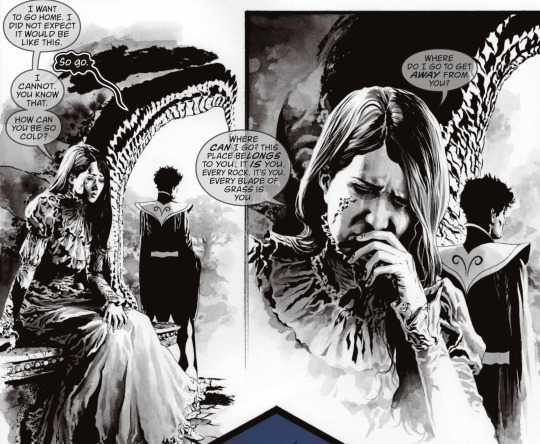
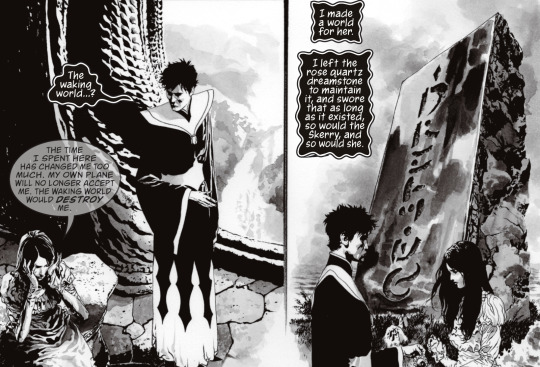
Philautia
And that’s the most heartbreaking one. He is incapable of self-love and full of self-loathing instead. The Ancient Greeks used to say that you can’t give what you don’t have. And it’s hard to feel compassion for the flaws we perceive in others if we don’t have that self-compassion for the exact same flaw in ourselves. And that one hurts in so many ways, from his not being able to forgive himself (which is mirrored in his relationship to Nada, who also couldn’t forgive herself—she didn’t need his forgiveness, she needed her own) to Orpheus being so much like him apart from one major difference: he’s mortal in spirit, and even immortality doesn’t change that. And Dream struggles with the part of his child that is so like him for a million reasons that would burst this meta at the seams, but again: it’s hard to love in others what we detest in ourselves, knowingly or unknowingly.
So in short: The particular flavours of love Dream feels (Eros, Agape, Philia growing slowly over time) and the ones he doesn’t (Ludus, Pragma, Philautia) are also at the very root of how the story goes.
And when he finally truly understands what Storge/unconditional love is--both in the way he reassesses his relationship to Nada but especially in how he finally submits to his love for Orpheus (with all that entails)--and when he allows it to become real, it’s what tightens the noose around his neck. But that noose has been around his neck loosely all along…
#the sandman#dream of the endless#morpheus#sandman#sandman meta#neil gaiman#the sandman meta#sandman bookclub#sandman book club#sandman spoilers#the sandman comics#hob gadling#the sandman netflix#nada sandman#orpheus sandman#calliope sandman#killalla of the glow#sandman alianora#desire of the endless#thessaly#morpheus and his doomed relationships#dream and how he feels love or doesn't
209 notes
·
View notes
Text
I'll Leave a Light On For You
Fandom: Bloodsucking Bastards / Max Phillips
Pairing: Max Phillips x f!reader
Reader: Adult female. No other physical descriptors; no use of y/n. (There is a little description, but it’s still you. Believe me, it will make sense. We’re dealing with the supernatural here.)
Rating: T.
Warnings: Angst. Character death. Allusions to the atrocities of war and its lasting effects. Max is a vampire. Traumatic soul memory. Me assuming I know anything about French culture of the 1930s.
Summary: Max has reservations when it comes to love, and for very good reasons.
A/N: This is my entry for the @pedrostories Secret Santa event. While I played one selfish card in my hand and wrote something of a companion to Light Only Shows You Where the Shadows Are, this can still be read as a standalone.
To my giftee, the amazing and wonderful @artemiseamoon : First of all, I admire you so much and I was really nervous to write for you. But I looked among your generous prompt choices (omgs thank you for so many good choices) and was surprised to find Max as an option. I wasn’t going to choose him at first but then my eye caught “past lives” and something in me zinged. Soul mates, angsty romance, second chance at love… and I’ve been itching to write an angsty Max. I know you are a fan of soft and whump, so all those elements had a party in my heart and here we are. I really hope you’re having a nice holiday and a good time off. Happy Secret Santa, Arte. <3
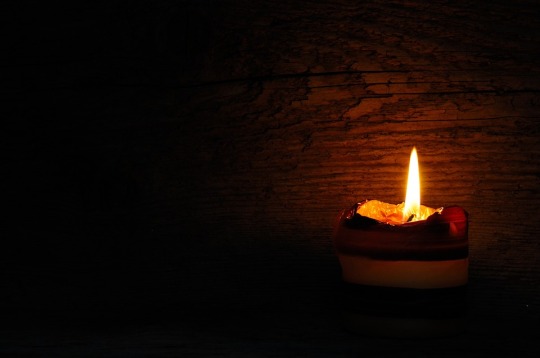
What we’ve been told is that when you die, your life flashes before your eyes.
That’s almost correct.
The truth is…it’s not just your current life.
It’s all of them.
Max hardly remembers the fear, the pain, the cold of his draining. Even though he knew what was coming, bought into the cult, the human instinct of fight or flight is hard to dismiss no matter how well they’ve been prepped and it was to be expected. But it was a flash in the pan and once he came around to the undead side of things, those pesky human responses were all quickly forgotten.
For a time. Until he saw your light and–
Anyway. Human instincts. Pffft. Adorable. Trading the constant possibility of fear for that of glee, of rapture, of delight? Human instincts are trash. Not to mention their senses, poor suckers. The things they can’t see can’t hear can’t smell can’t taste? Tragic.
If only the feelings weren’t heightened too. It makes some things–some people–hard to ignore–
Feelings were something he could also have done without in his human life–the latest one anyway–and did whatever he could do to avoid.
It wasn’t until he died that he understood why.
As the life drained out of him and the delirium set in, there was a rushing sound, a pull through his soul like the drag of blood from his body, and he was laying, feeble, wailing, bloody and naked among the limbs of his mother.
But not the mother he so recently remembered, the one that showed her approval only when he provided her with some accomplishment worthy of crowing about to her society friends. No, this one was gentle, kind, held him and sang to him, lived her life for him until she died of fever when he was only five years old.
Max saw it all, from within himself and without, remembered the pull of his heart and watched the tears fall down his little face as they nailed his mother’s body in a pine box and put it in a hole at the top of a hill under a tree.
He always imagined he heard her singing to him in the grasses after that.
The world welcomed a new century, and not long afterward, he was a young man, looking to take over his father’s wine fields. But the chance was stolen when an archduke was shot. Max–Pierre, as he was called then–and all of the close friends and cousins he had were thrust into a great war.
He was the only one to walk out of the fray. And when he came home, he found his father’s fields had been burned and that nothing remained.
That was a dark time. Ten years of looking back rather than looking forward. Ten years–it went by so fast–while he watched the world around him try to repair itself and find its footing again, not realizing that the roots of evil still grew beneath the soil.
He kept his head down and his hands working wherever he could.
But then he met a woman.
And she was Pierre’s life. Max’s life. Before he was Max.
It happened in the winter, just before Noël. And her name was Yaëlle.
Max remembered that before she even told him as he watched the story of this strange old life.
Yaëlle. It means “beautiful one.”
“It also means ‘goat,’” she’d said. “That seems more fitting.” She never thought of herself pretty, and perhaps she wasn’t fashionable and maybe she was stronger than she was dainty, with a weak chin and curly dark hair she couldn’t control. But the light in her eyes when she laughed–and what a laugh, like a little bird–the sway of her hips and the confidence in her carriage, her air of easy care and comfort caught his heart like a surly bear in the prettiest trap.
She’d simply been passing through the marché de Noēl, looking but not stopping, taking the kerchief off her head so the snow could land in her curls, when a child approached her selling buns in the shape of a cross and she gave the child a franc before sitting down at the statue of some cardinal or other in the center of the square.
She could have sat on any of the other benches, but she chose to plonk down next to Max. Next to Pierre.
“You want this?” she asked, offering the bun. “Not really my thing.”
How could she have known he was hungry? That he was lonely? That he was facing the market rather than the river because he was trying not to succumb to his inclinations, a pull to walk out onto the thin ice and let himself be taken by the stream?
He was instantly entranced by her. He felt himself smiling. Something shifted within. A destiny.
“You sure?” he asked.
She peered at him, scrutinized his whole self like she could see a glow around him and was looking for its source.
She found it in his eyes.
“Absolutely. I already ate three hand pies today. The last thing I need is more bread.”
He laughed for the first time in a long while. They talked. He ate.
On Christmas Eve when everyone was at the evening’s mass, she was there again, sitting alone, and this time it was he who had hot food and came to join her on the bench while the night was silent and cold and the stars were twinkling.
It was then that he learned why she was not in church–her folk did not observe Noēl. And she learned why he was not in church–he had lost his faith, that everyone he had ever loved was taken and there were not enough candles in the sanctuary to light for all of them.
“What if I lit one?” she’d asked.
“Who would you light it for?”
“For you. So you don’t have to sit in the dark.” When he was only silent, she said, “You fought in the Great War, didn’t you.” And when he looked away–when he shut her out–she continued. “My husband fought in that war. And he never could find his heart again. He said he loved me, but I don’t think he ever really did, not all the way. But I loved him all the way and when he put an end to his own life I thought I would have to do it too. Instead, I sat in the dark for a long time. It’s something I can see in a person. I can see you’re sitting in the dark.”
They stayed quiet for a time on the bench under the statue of the cardinal and when the church bells started to toll–signaling the magic of the empty square would soon be disrupted by the mass emptying into its streets–she stood and pulled her coat around her.
“My home is down that street, a little one with a red roof. It’s warm and I’ve plenty of hand pies--I made too many. I’ll leave a candle in the window until I’m asleep. You’re always welcome there, Max.”
And then she smiled and turned down the avenue where she’d pointed.
He blinked. Just before she reached the edge of the square he called out, “My name isn’t Max. It’s Pierre.”
She turned and gave a sly wink. “Good to know. I think once you get a belly full of my pies, you’ll let me call you whatever I want.”
He only sat long enough to watch the churchgoers file out of the holy service, many of them with people they loved, humming, happy, cheeks glowing in that way when one steps into a fresh cold world after being an hour or two soaking in the warmth. And once the square was empty again, he stood, gave only a fleeting look to the river, and then walked resolutely down Yaëlle’s street.
A little house with a red roof and a candle in the window.
He stayed for supper and came back many nights after.
And then one night he never left.
Max recalled the rest of that life with a lurking despair. While he couldn’t quite remember how it went, something in him carried it through to the life he’d just left…and he couldn’t pinpoint exactly what it was yet.
A few years of joy, of the greatest love he’d felt since his childhood. Like the mother he’d lost, another woman who was gentle, kind, held him and sang to him, lived her life for him until she couldn’t anymore.
They never celebrated Noël as the others did, but in their own way. For a handful of years they would go sit on the bench in the square and hand out pies to their neighbors and anyone who came to join them where they sat. They would listen to the singing in the church and watch the stars scintillate overhead. They would leave their shoes by the fireplace and wake up to find gifts they’d bought for each other with the little francs that they had. And they would never talk about what they would do in the future, because they knew it would be this and that’s all they aspired to and it would be a happy life.
And Max watched Pierre forget about the rot that still ran its roots through the soil.
And one day soldiers came to town when he was out in the fields and they took Yaëlle and some of the other dark-haired, joyful, bird-laughing folk about town and murdered them. By the time he returned for the evening, the soldiers had gone and left him nothing but a ravaged house and a body to bury.
There’s nothing he could have done, the mourning neighbors told him, the tide was rising. If he had fought them, they would have shot him too.
Pierre said that it would have been better that way.
Pierre stopped working in the fields when he started to hear his mother’s voice singing among the grasses again…now joined by Yaëlle’s sweet alto.
He had one more Noël in that life. He drank as much as he could take without falling over and stumbled out to sit on the bench in the square, weeping once the churchgoers had gone. He didn’t say a word, but Max remembered what Pierre was thinking then.
Love hurts too much. It is always taken. It’s not worth the trouble.
And then Pierre fell asleep on that bench and never woke up again.
There wasn’t much time between that first life and this one, maybe a few decades in the dark. Just long enough for a voice to reach him in the void–a voice he knew well and loved with his whole heart for only a short time–to say,
“That was a good first try, Max. Let’s give it another go, okay? Another place, another time, when it’s not so hard. I’ll leave a light on for you.”
____
Max’s life had been shorter this time. But he’d learned a thing or two and kept love at arm’s length. Sex was good and companionship was fine, but he wouldn’t invest in anything that could drain him in an instant and leave him destitute.
Now power, that could fill the void.
So when fortune smiled and he was given the choice, he swallowed hard and put his neck to the teeth, traded in his humanity for power that nobody could take away from him…and a heart that had no need for warmth.
He was wrong about that last point though.
And he didn’t even know it until he saw something that humans couldn’t see.
Heard something they couldn’t hear, a long ago and far away voice singing.
Smelled you on the wind.
Followed it to you–a woman, just another human woman–walking out of a bar along some street in the city.
And he saw a light glowing from within you.
You wore another face, another body, but all he saw was you.
Yaëlle.
Beautiful one.
He followed you that night, and several nights after. He was the reason that car swerved before it hit you, the reason you weren’t approached by that seedy guy at the club. He was the reason you kept looking behind you now and then and when you finally saw him–having dinner at the same restaurant, totally by coincidence, you on a friendly outing, him trying to charm a client into a contract–it broke his heart that you did not know him instantly.
He found he was surprised that he still had a heart to break. He’d been so fucking careful.
Max almost gave into the anger, the disappointment. Replayed the pathetic way Pierre let himself be brought down and tried to remind himself not to let himself be broken again.
But then he heard your voice in a way only those who walk in death can.
Let’s give it another go. I’ll leave a light on for you.
____
Heightened feeling is the one drawback of all this power. It’s one thing to latch onto a target, to fixate on some middle manager or accountant or IT specialist until there’s a good time to finally strike. That is an itch that can be satisfied with a well-timed, fear-seasoned, adrenaline-soaked kill.
But love sinks its fangs in and doesn’t let go. It sucks at something that can’t be drained, has no end, can never get enough. It can drive an immortal--a never-ending being of heightened existence--to madness.
There will come a day in the future when you’ll trust him for no good reason, when you’ll understand the monster he is and whisper under your breath against your better judgment, when you’ll invite him in. For dinner.
And he’ll come around again and again.
And then one day, he’ll stay.
And you’ll yawn ask him on the edge of sleep, “Why me? Of all these humans that you could easily enthrall and have without question, why choose this?”
Max will look at you in the darkness and see nothing but your light.
You won’t understand when he puts on a show of an irritated sigh and tells you, “You gave me another chance, sweetmeats,” but you’ll doze in his cold arms, absolutely confident as he is that nothing will ever hurt you again. Including himself.
And that night he’ll stay until you wake.
He won’t have you sit in the darkness alone.
_____
MASTERLIST
CHARACTER MASTERLIST
#pedrostoriesgift23#pedrostories#bloodsucking bastards#max phillips#max phillips x reader#max phillips x f!reader
156 notes
·
View notes
Text
The major question of the story that we are now asking:
Why, exactly, does Carlo never "wake up"?
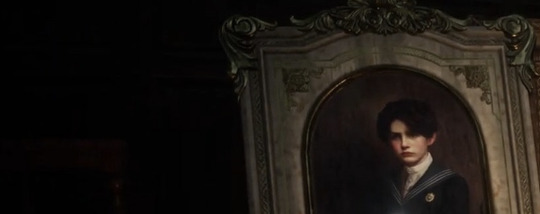
[long post]
[Spoilers ahead]
Well, simply put - Because he is dead.
OK, that seems like too obvious an answer, but I'll elaborate, and bear with me here. I want to recap some elements first so you know where I'm coming from, but I'm also trying not to completely explain everything because that's way too hard and would be too long.
[Currently, we don't understand everything about the story or its meaning. Because of some of the shrouded nature of the lore and narrative, it leaves much mystery. But from viewing these questions and the story from a thematic standpoint, something unexpected and really cool happened. I found that the story and the lore opened up in reverse.]
The easiest way to explain the plot (in my opinion):
It was my impression that Geppetto never “started” the puppet frenzy. The puppets were NEVER breaking the grand covenant, interpretably they are protecting humans by stopping the spread of the petrification disease, it’s just that everyone in the city was infected by that point.
Now with the puppets killing everybody in a city where everyone was infected (ergo being the result of the disease) Simon can go around harvesting all that ergo and Geppetto presumably plays him by letting Simon collect the Ergo first, and then sending P to kill him. [again, these details may not be completely accurate, but bear with me here]
Why create P in the first place?
He's made in Carlo's image so to speak because Geppetto hopes that Carlo's spirit will awaken. This is also why P is never bound to the covenant (it seems that not being bound to robot laws makes puppet egos awaken faster, since awakened puppets can break the grand covenant). So that is the two functions of P, to destroy puppets for ergo to harvest and so Carlo's consciousness can restore. I was just guessing that the arm of god was enough to get Carlo to revive, and Carlo's mental spirit reviving would be helpful but not entirely necessary. But for reasons we don't understand, Carlo never does regain consciousness.
Geppetto bitterly tells us that we don't seem to have inherited Carlo's memories. There is no big moment where Pinocchio or Pino or P reawakens, fully, as Carlo. He isn’t treated by the story as him. During the course of the game, P struggles to forge his own identity, to become a real boy, despite starting as a copy of the original. It’s a very fitting parable for the genre identity of a soulslike.
However, there are other successful re-incarnations of people through puppets, namely Sophia at the end of the Rise ending. We ask, for consistency's sake, why are puppet-form Romeo and puppet-form Sophia assumed to have retained their original identities, but not Pino? This is just my personal interpretation of why Carlo just couldn't or doesn't wake up. It isn't really based any lore or deduction from story details, this is from more of a philosophical point of view. And it isn't just the luck of the draw.
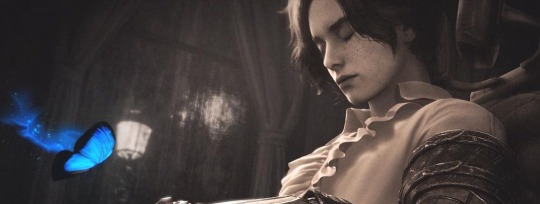
I had some initial thoughts about Carlo's failure. Romeo was made with intention of continuing to fight against the disease, as it's told that he "made a deal with the devil". Sophia may have been a special case, as she is a listener (Arlecchino even refers to her as the goddess in the tower), she may have had an ergo identity so strong that her essential self could retain this process. But either way, the implication is that Pino may have been able to recover her not long after that final fight. Look at the nameless puppet. The state of Carlo's body is so poor, that more than not his body seems to have been replaced with puppet parts. I think the implication was that Geppetto had been replacing parts as they rotted away. Maybe he had simply been dead for too long. But again, this isn't exactly why I think he couldn't awaken.
Simon and Geppetto
Lies has two main antagonists, although one isn't completely revealed until the last section. Both Simon and Geppetto are the perpetrators of Krat's destruction, but for what seems like different reasons. Simon is trying to be reborn, and Geppetto is trying to revive his dead son, Carlo. Interpretably, they are both trying to become Gods. Simon by grasping the supernatural, cosmic power of one, and Geppetto by raising the dead. They have destroyed Krat in their attempt to become a god, or more succinctly put, attempting to become God, singular. Geppetto's goal is, in essence, the same as Simon's goal - Because bringing back the dead would make him God.
That's why it seemed all so confusing. Haven't Geppetto and the alchemists already raised the dead, as Pino does at the end of the Rise ending with Sophia? Sophia, Romeo, and Carlo were all afflicted with the disease. Their Ergo were all made into puppets, but there's a minor but important distinction here. Sophia is still alive in her condition and actively suffering, this is the reason why she asks us to end her life. It seems as though Romeo lost his friend to the disease, and then made a "deal with the devil" to continue fighting, this implies being made into the king of puppets. We collected Sophia's ergo while she was alive, which we then used to animate the puppet. So the three of them were afflicted with the petrification disease. Sophia perished, Romeo perished, but Carlo died.
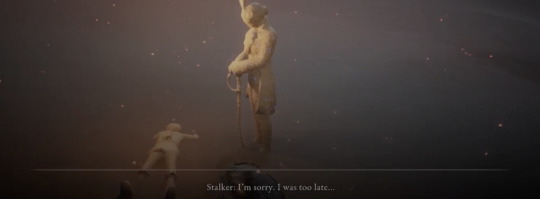
Now if we see the sand memories section of the beach, the stalker's words start to gain some clarity. If Carlo died from an incurable disease that the stalker couldn't prevent, why is she too late? Perhaps the goal was never to "save" Carlo's life. She laments; That she was too late, NOT to "save" him, but for him to be able to be restored. The stalker seemed to understand that whatever procedure needed to be done would be useless past the point of death.
I have to admit that there was something that I thought could override my theory. It seems as though the alchemists already were able to bring back both Champion Victor and The Eldest of the BRB, and from the dead no less. We read from notes in the Grand Exhibition that Victor had caught the disease, died to the despair of his adoring fans, but then miraculously made a comeback somehow stronger than ever. But maybe - he had only appeared to be brought back from the dead to the public, as Victor sought the help of the alchemists. And when it comes to the Eldest in the coffin, I'm wondering if he was actually only mortally wounded, leading the brotherhood to consult with the alchemists. [The way he was carried out by his brothers too (shouldered on either side) isn't typically the way you would expect people would handle a dead person]
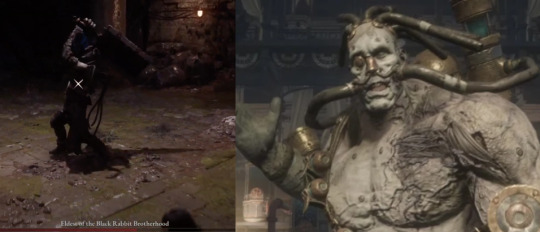
Mirroring Sophia, Romeo, and Pinocchio, who were made into puppets: There is Champion Victor, The Eldest, and Nameless Puppet. We can see the former three as Geppetto's method of "cheating" God (cheating Death), and the latter three as alchemists' method. Only "Carlo" has a form in either one - The Nameless Puppet and the player, P. The Nameless puppet appears to share a similar undead quality with Victor and The Eldest of the BRB (including the tubes). We know that the collected Ergo can animate puppets, They are puppeting around their own dead bodies.

I feel like the Nameless Puppet tells us in a poetic way that Carlo is gone. My thoughts on this are more abstract. Again, this isn't from a factual analysis, but more of from viewing the Nameless Puppet itself as a metaphor. The Nameless puppet has qualities similar to the other undead bosses, yet the game doesn't describe it like it does Victor and the Eldest. It's not a body. It is a puppet [Human on the outside, mechanical on the inside - the inverse of our protagonist]. And straight in the text, we are told this is "The Nameless Puppet". But we know who Carlo was. His name was Carlo. We split open its head, and there are only cold, mechanical parts, instead of what we in the modern world now regard as the very most essential self (the brain). Because there was nothing to recover, there is no one there. Carlo's spirit had long, long since departed the world.
We are also told through one of the game's narrative devices that the Nameless puppet was the first puppet fitted with the organ. Ostensibly, Carlo's body was being prepared for whatever procedure that needed to take place, but Carlo died before that could happen (perhaps thankfully), and Geppetto pushed forward with his plans anyway, perhaps past the point of no return.
There are two forms of revival and we represent one of them, as in, there was the puppet form of Carlo and the undead form of Carlo. Presumably, the undead form was incredibly destructive, and thus stored away; We are the second try for Carlo's rebirth, this time in the puppet form, but we cannot even wake up without the aid of Sophia.
Lies, God, and the Finality of Death
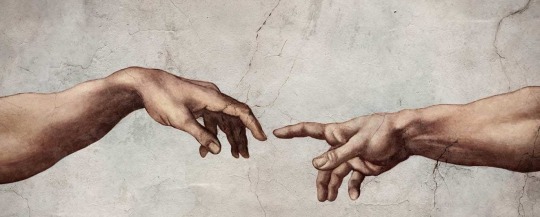
But doesn't Geppetto actually succeed in one of the endings? Simon fails to become a god, (well, presumably only because we kill him in the process of doing so) and then we confront Geppetto. If we hand over our heart, Geppetto actually does revive Carlo. We see the resurrected Carlo, but with one simple smile we realize this isn't the Carlo the game has been leading us to believe existed. This ending leaves us with distrust and unease rather than a sense of peace and resolution. Simon fails to become a god, and at the bad ending - even if he "wins" - the game makes us wonder if So does Geppetto. No matter what, Carlo could NEVER be truly, and in both senses of the word, honestly, be revived.
[Simon Manus - like Simon Magus, the biblical figure who tries to buy into the supernatural power of God. And Geppetto, of course alluding to the 1883 italian novel The Adventures of Pinocchio - a puppet master, a creator indeed, but of wooden imitations of life, and a poor imitation of God]
So, why I think Carlo could not wake up? Because whatever needed to happen could not be done after the actual point of death, and Sophia and Romeo's hearts were both transferred before they actually died. His spirit had long gone from this world. Krat has methods of eternal life, but these transfers happened while they were still alive. While the alchemists and Geppetto could certainly cheat death (as we maybe even would with modern day medicine), they could not defeat it. Carlo can no longer wake up, Carlo can never wake up again, because he is dead.
193 notes
·
View notes
Text
Bitter Work
Life took me out at the knees for a couple of weeks but I'm back! I'm hoping this is a nice restful episode after the relentlessness of The Chase.
I have to say, Toph's nicknaming skills are on point. I never would have thought of Sugarqueen, but it fits perfectly.

This is me. Every morning.

Full nose plant from Appa.
And the beat up Sokka quota is fulfilled. Very funny Toph, but completely uncalled for. If someone had catapulted teenage me 50 feet into the air while I was trying to sleep, it would have been fully justifiable homicide.
Aang is always trying to run before he can walk. What was Iroh always saying to Zuko about basics? Aang needs that speech too.
I was really on the ball in my post about how airbenders aren't homicidal, actually. Rock is a stubborn element. Yay me!
Aang earthbends = Earth bends Aang.
Seriously, how did he mess up that badly?
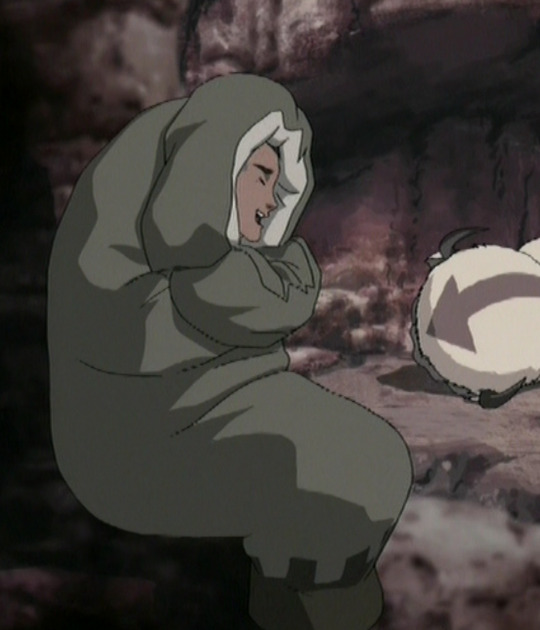
Cozy.
Thank you Zuko for the incredibly obvious exposition that's somehow completely in character. Interesting to see that Iroh and his son had brown hair, but Zuko seems to have black hair. More hair variety in the Fire Nation than I thought.

Tangent time! I love the contrast in social intelligence (I guess that's the term?) in this scene. Zuko wakes Iroh up with an infodump, some bad tea, and then gets straight to discussing strategy. Iroh's first actions are to compliment the bad tea, then dispose of the refill in a way that won't hurt Zuko's feelings (probably not necessary, as Zuko seems to be the type that's oblivious to all things other than the task at hand when he's focused). Iroh, injured and awake for all of 15 seconds, jumps straight to actions that help look after his nephew. And Zuko is trying! That's why he made tea! But still, he doesn't even ask if his uncle's feeling ok. Zuko has such a massive gap in his education - he can probably reel off the specs of all Fire Nation battleships, but he doesn't know how to be a human person. Contrast that with Iroh, and especially Katara, who makes friends and connections with such aggressive forwardness that she's at times more steamroller than teenage girl. It's funny how privilege plays into this too - Zuko comes from probably the single most privileged (on paper) family in the world, yet it's the children of the impoverished water tribe who have the more well-rounded education/socialisation.
"She's crazy and she needs to go down" go a full belly laugh out of me.
"What if I came at the boulder from a different angle?" Jesus I was REALLY on point with my post about the airbenders. Credit where credit is due, this show has such good writing/worldbuilding that viewers have picked up what Toph is laying out in this episode already. Also a little bit of stealth character work in there - since Toph is putting into words what we've been thinking this whole time, she now reads as trustworthy. This show is so good. So thought out.

Maybe it's just VLC being weird, but methinks Katara is having some trouble with her eyeball.
Katara STOP BABYING HIM. This is why I don't like Aang having a crush on her.
Honestly it's refreshing to have Toph giving it to Aang straight, no softening the blows.

I really like this texture.
Sokka's club is a giant bottle opener. Or at least a multitool.
ROCK SUITS
wait
ELEMENTAL FASHION
oh this is going to be haybending all over again.
They are totally going to have to nerf this girl. She could defeat the Fire Lord right now.
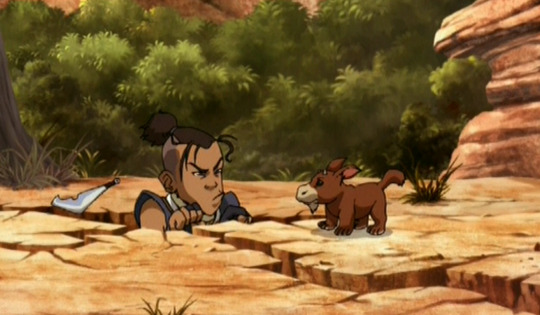
Earth beats water tribe
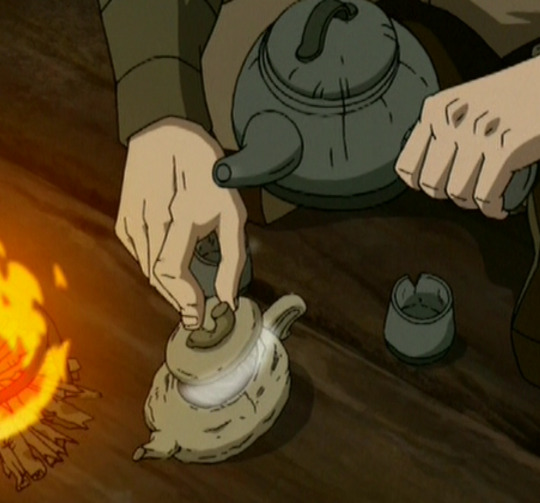
Someome who knows more about tea than I do: Why are both pots necessary?
"requires peace of mind" well that's out. Sorry Zuko, we'll have to get you a taser instead.
"So we're drinking tea to calm down?"
"not it's to get the nasty ass taste of the sludge you brewed out of my mouth. I mean yes."
For what's looking like an extended training montage, this episode is far funnier than it needs to be.


I pretty much don't notice Zuko's scar anymore (it's just part of his character design) then every so often a certain frame of animation will come out of the blue and remind me that this kid's missing half his face. I don't know if it's intentional on the part of the animators, but his scar is prominent this episode.
So it sounds like bending lightning actually corresponds with how lightning in our world works. Neat.
In an absolutely Shocking turn of events (pun absolutely intended), Zuko fucks it up. Fucking shit up: the autobiography of a Fire Prince. Has a nice ring to it.

Toph I know you go hard, but maybe apply a sense of proportion to this?
It kind of looks like Aang's about to be run over by a giant scoop of caramel ice cream.
Toph is such an interesting mishmash of bluntness and emotional intelligence. I don't think I've seen a character like that before.
Zuko being self aware for once! Everything always does explode in his face. Except when he's being the Blue Spirit. Seems he's more capable then.
It's a tragedy that this boy wasn't around for the emo movement. He would have single-handedly sustained Hot Topic.
Zuko going "WHAT TURMOIL?!?!?" is like Katara going "I'M COMPLETELY CALM!!!!!" last episode. Also got a laugh out of me.
"I'm as proud as ever." OF WHAT?!?!? What could he possibly be proud of? He's a homeless fugitive with a stolen horse bird and a half-dead uncle that he can't even properly brew tea for. The self-delusion is strong.
Is pride the source of shame? Honest question, I don't know.
There's a surprising variety of trees in this part of the Earth Kingdom. Where Zuko and Iroh are there are fluffly hardwoods, probably deciduous; Toph's training ground is ringed by cartoon pines.

This whole bit is too cute for words.
"Now come back boomerang" This is a training episode, it's not supposed to be this funny!
Are there voice acting awards? Like voice acting oscars? Sokka's actor needs one. Or several.
I should have waited to answer the ask about airbenders and just copy pasted Iroh's speech here. Except for the water = change bit. That doesn't make sense.
What can I possibly say about Iroh's speech? It's the thesis for this show in a single paragraph.
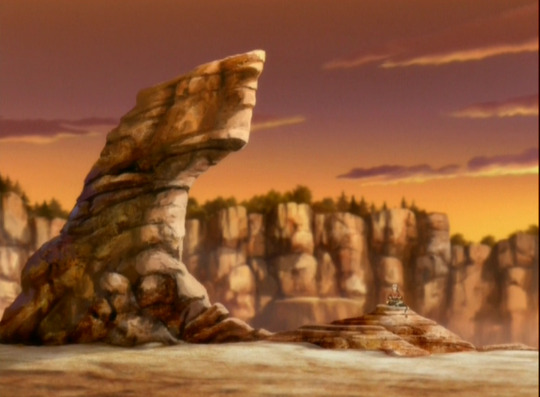
Pretty.
Are characters' eyes a different shape this episode? Aang's eyes change colour all the time, but everyone's eyes seem more cat-like.
I do love me some constructive bullying.
Sokka is so refreshingly self-aware while still totally oblivious. He is meat and sarcasm, but he's so much more!
"Have you got any meat?" He said that in an Irish accent.
"You're gonna pull my fingers off and I don't think the rest of me is coming!"
Do you ever come across a sentence that is so obviously an innuendo that your brain trips over itself trying to decipher it?
Sokka's hair must be so fluffy. It's got so much volume.
Why can't he go get Toph? I think being stuck in a hole outranks avoiding an awkward encounter.
FOO FOO CUDDLYPOOPS
"You must not let the lightning pass through your heart, or the damage could be deadly." Foreshadowing?
Today in 'things Zuko thinks it's acceptable, nay, expected, for parental figures to do' - attempted murder as a teaching method!
What went on in that palace?
Is this the closest Sokka's come to dying?
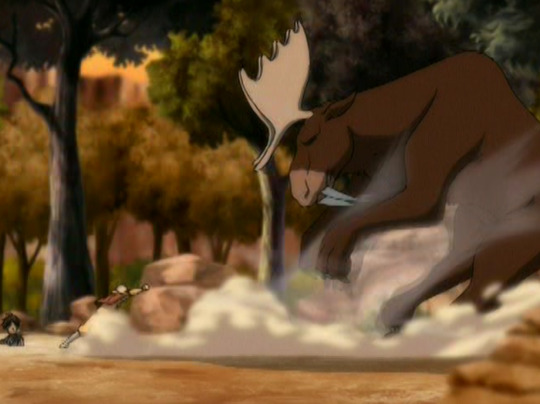
He's earthbending the air! Doing air but earthlike. You know what I mean.
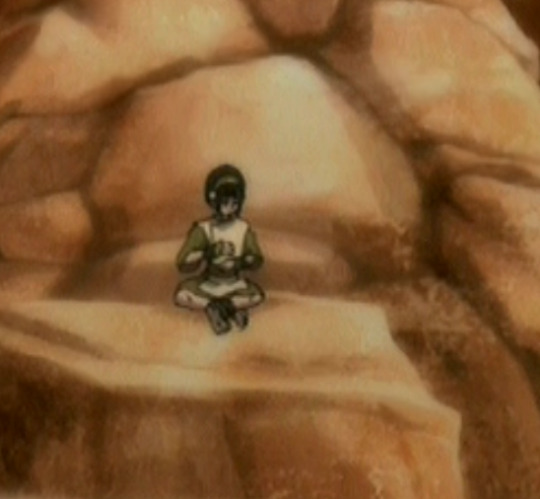
I thought she was levitating.

Toph is so smart. She does the airbender thing and comes at the problem from a different angle. Telling Aang to stand up for himself doesn't work? Fine. Let's bully him into standing up for himself. And it works!
This episode's MVP is Sokka's patience.
"You tried the positive reinforcement, didn't you?"
uhhhhh
sure!
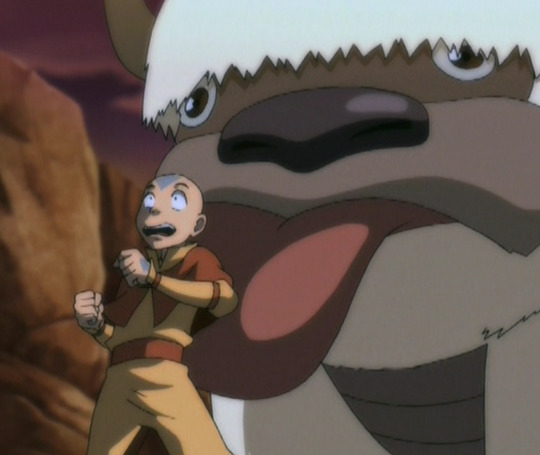
Appa getting vengeance for Sokka. Nice.

Theatre kids.
I wish Zuko would just have the breakdown he's obviously hurtling towards so we can get started on the rebuilding arc. Every time I think he's a rock bottom, he keeps digging.
Luten is Katara. Let's not read too far into that one.
Final Thoughts
I defy any episode from this point on to fulfill the Beat Up Sokka Quota as thoroughly as this one did.
In a lesser show, the 'Aang learns earthbending episode' would have had Aang & Toph as the A-plot, and Sokka & Katara doing something completely unrelated as a b-plot, and probably no Zuko at all. Sokka does have his own thing going on this episode, but the fact that they managed to weave in both water tribe siblings so organically is so satisfying. Of course a team member struggling to learn a new skill would seek out his friends. Of course his friends are in the area, observing the lesson to varying degrees. It feels so much more real to have the characters who aren't 'useful' that episode still there, rather than conveniently absent.
Zuko was very Zuko this episode. He's correct that he needs more training for his inevitable next encounter with Zuko jr., but Iroh is also correct that Zuko is a bundle of issues held together by a different bundle of issues. Not to jinx it, but I thought I detected a hint of self-awareness from Zuko this episode, although it seems to have occurred despite his best efforts to suppress it.
Iroh's Zuko-wrangling skills were sharp this episode, despite being injured. And his wisdom was off the charts. Zuko was also not as annoying as I usually find him, and unlike in Zuko Alone where I found his quieter self to be out of character, it fit this episode. Maybe he's turned over a new, quieter, leaf? I loved "she's crazy and she needs to go down" both as a joke and as a statement. Shared blood doesn't trump someone's actions, and I'm glad to see a show meant for kids acknowledge that. Although, given that this show has no problem depicting objectively BAD parents and families, I can't say I'm surprised.
In a testament to Jack de Sena's skill, Sokka get a soliloquy this episode and pulls it off flawlessly. Kudos to the animation team for making Sokka's face fit the words so well. Double kudos for whoever had the balls to approve 'stick Sokka in a hole and put an apex predator on his head to force self-reflection' as a plotline.
There was a lot of exposition from a lot of different characters this episode, but it's mostly unnoticeable. It just makes sense that that's what they would be talking about at that point in time.
I think I said it above, but I'll say it again: the worldbuilding in this show is phenomenally well done. How do I know this? Because I was able to construct most of Iroh's monologue before watching this episode, just by paying attention. This show rewards focus and attentiveness. (Almost) nothing that Iroh said was not something the audience has already observed for themselves. Not heard, but observed. That 'show, don't tell' thing.
This episode was way funnier than it needed to be too. Not just the obvious stuff like *inhales*
FOO FOO CUDDLYPOOPS
but tiny one-liners buried mid-conversation and character interactions too. Momo turning into a reed didn't have to be there, but it was, and it was funny. It wasn't exactly restful, but it was a relief to have an episode that really didn't move around after The Chase.
What I like most about this episode was that it went farther than it had to. This was a training episode. It could have been just training. Anyone familiar with training episodes would expect just training, and be satisfied with just training. But Avatar said 'nope, we'll do better than that' and organically incorporated a heap of character stuff, worldbuilding from multiple perspectives, humour, multiple characters undergoing self-reflection, the next step in the domestication of Zuko, what I'm hoping wasn't a heap of foreshadowing, and pretty backgrounds as the cherry on top. They didn't have to go so hard, but Avatar always goes hard. I like that.
171 notes
·
View notes
Text
I have seen people question whether dios apate minor really needed to happen the way it did. it's the 'this could have been an email' of htn. 'augustine this did not have to be a threesome', I hear people saying. and boy do I have an obnoxious amount of things to say to protest this perfectly sensible assertion so here we go haha
1) yes it absolutely had to be like that. It says so on this piece of paper *hands you a piece of paper that says "because I said so and also it's narratively and thematically Sexy"* in my half-legible handwriting. seeing tamsyn muir describe harrow the ninth as a book about being a kid and realizing your parents probably had sex has given me such validation, I am unstoppable now. (to be serious for a moment, harrow the ninth is essentially a bildungsroman, and the threesome scene does a whole lot of thematic heavy lifting around harrow glimpsing elements of adulthood, relationships, and sexuality she clearly finds at the same time repulsive, bewildering and fascinating, and around opening her and especially our eyes to how much john is just a man with human longings still, under the god stuff. dios apate is crucial plot- and character-wise too -- it's a loadbearing threesome in terms of delivering the clues you need to piece together the mystery plot of the book, which is simply delightful -- but even more so thematically. and then the scene at the end where they confront john gives gideon some of that same opportunity to peek into adulthood and go '...well shit I guess', as a sort of mirror, just without the french kissing that time and more murder. the things magnus and abigail model for the girls about love and adulthood? mercy and augustine are providing the opposite-day batshit insane version of that fhdskjfa, you know, for contrast and spice)
2) listen... it gets lonely out there in deep space with your 'legendary unamorous' brother, two infant pathetic baby kitten sisters who you'll probably have to kill one day when you take another stab at god if they don't manage to get themselves killed along the way on their own, and the two people you've spent the last ten thousand years having separate yet connected married & divorced arcs with and also btw one of them is god... honestly a threesome over the dinner table is probably The most well-adjusted reaction one might hope for under those circumstances
3) on a characterization level I think Augustine is actually doing something incredibly deliberate with it: he's presenting John with yet another chance to admit what he did. which is notable especially since the deal he and mercy agree on as a condition for the threesome to happen at all seems to be that they're going to give the ol' godslaying another game try sooner rather than later. (I get the sense that it's not so much that he disagrees with her ultimate goal so much as that he thinks she's being dangerously indiscreet and hasty going about it, before. “though I think it will be the death of us,” huh.)
notice how he's structuring the whole thing: he's invoking the intimacy and love in their strange little threeway relationship and how long it's been by truly playing along with john's 'we're a happy family really when we're at home! :)' delusion (helped along by lowered inhibitions via enormous amounts of alcohol and what I've previously described as a joint mercy/augustine leyendecker themed thirst trap. ah, a classic). he brings up alecto and what happened to her -- or rather, he is clever enough to make john bring up alecto and how she is totally dead, right?? by seeming to make a careless statement that leads there and then acting contrite about it after. he (helped along by mercy, who I think realizes exactly what he's doing -- this is very much a two-man con) brings up how much they all loved their cavaliers, and wow funny how that's been haunting us for ten thousand years now huh :) wow, a lot of our other lyctor friends slash family sure are super dead in the name of some unknowable greater reason neither of us quite grasp and that you won't fucking tell us, aren't they. these are all the main grievances he and mercy confront john about at the end of the book, but put forth much more subtly and not phrased as an accusation -- he's baring his and mercy's vulnerabilities as bait, essentially. if john had, say, a conscience where his conscience should be instead of a black hole, it probably should have stirred something in him.
(also let me just say... the way augustine just takes a pneumatic drill to the TWO tender spots g1deon seems to have and then has the audacity to be like 'oh dear. did that upset him. ooof my bad *loooong dead-eyed slurp of his wine*' is just sooo... he's such a bitch!!! he's the only person who could ever have held their own in a ten-thousand-year bitch-off with mercy and I love him so much. well even if it wasn't all to get g1deon into murder range for harrow I think he wouldn't enjoy sticking around for the 'getting our tongues on god' part of the evening so maybe it's a kindness, really, and totally not pent-up aggression from the last twenty years or so breaking through)
he is all but shaking john by the lapels begging him to just... come clean about it already, to stop thinking he's still kidding everyone else along with himself. it's clear throughout the book that augustine knows exactly what john is at this point -- and all of the most cynical things he does say about it turn out to be distressingly right. john is always less sentimental than you'd think. john wouldn't forgive mercy, he will abandon in a heartbeat anything that isn’t necessary to him anymore, whether emotionally or in some other way. and still he seems to hold out some desperate absurd hope that the man he wants, the man he thought was there, is in there, somewhere deep deep down, if he just gives him the chance to show himself.
(mercy definitely has her own side of this whole thing, I'm just focusing more on augustine because this evening was like. his idea in the first place and I feel like we can Read Some Things into that fact lol. now that we have both ntn and htn to go from I sort of have this sense that the things augustine wants from john are more... personal? more interpersonal? they both love him equally, but mercy's love seems tinged slightly more towards the religious (augustine accuses her of knowing 'only worship without adoration', which like... also the eight house's entire Vibe lol) -- mercy at the end of that book is totally a person breaking up with GOD, not just with john -- while augustine's vibe is more like a man in the last not-with-a-bang-but-a-whimper days of a marriage that sort of felt like it could have been something real and good once but all your illusions about it have since been taken from you and trampled underfoot into the mud and you've had the divorce papers signed and ready in a drawer for over a year now, hell, as it turns out, is other people etc. lmao)
having a threesome over the dinner table with god is one thing, having a threesome over the dinner table centered on the one man and god who has yet again let you down in a way so fundamental it can barely fit into words and who you both still love in a way anyway, miserably, and also just reaffirmed your joint resolution to murder (all under the pretense that it gives your baby sisters the chance to murder your brother of ten thousand years yeah that's why this is happening no other underlying aching emotional motivations here haha)... listen mercy and augustine are simply on a different level, theologically. they've added horny shrimp colours to the religious spectrum. who else does it like them
#the locked tomb#harrow the ninth#augustine the first#mercymorn the first#john gaius#dios apate minor#bad cop worse cop and sorry cop#augustine 'when I die I want john to lower my casket#not so he can let me down one last time that's honestly a given at this point#if at all possible I just want to pull him down into the grave with me' quinque#first saint to serve the king undying#nona the ninth spoilers#nominally? in that I am saying there's relevant information to this polycule clusterfuck in it? eh let's just be safe lol#just when you thought I had no more thoughts about the terrible old people to unleash upon you... here I am again hahaha#the locked tomb meta#also yeah I mean I guess they didn't actually have to get their tongues on god on-page for all this to still be true#but I'm glad they did let them have some lyctor enrichment#hate fucking is actually lyctor love language hashtag did u kno
1K notes
·
View notes
Note
Bird Zoo Au! Mc having to stay at the zoo overnight because the boys contracted some sort of illness. Something that needs to be monitored closely, to the point that she's run ragged. A perfect opportunity to have a feverish harpy scooch their exhausted mate into a nest for some sleep.
Sans: She has to stay the night?
Hehehehe. Heheheheheehhehehe.
She has to keep an eye on him, and give him medicine all through the night. Which means, much to his delight, when he moves away from her she chases him. He might be ill, but it really doesn't take that much effort to play with her- he's like a dog holding something important in its mouth. The more frantically she chases him, the more eagerly he coos and darts away.
He likes to disappear into the darkness, then sneak up on her and surprise her; her shrieks are just the right amount of cute and prey-like to be instinctively pleasing. Owl harpies are whisper-silent and hella frightening, and despite knowing him well, her hair still prickles when she has no idea where he's gone and the aviary is totally silent, her calls of his name going unanswered.
His favourite scare methods are when he suddenly hangs upside down in front of her, and when he flies overhead to snatch her up. But it works for both of them in the end; every time he surprises her, he allows her to give him some meds.
When she does eventually fall asleep, he stands guard, like a good husband. He loves his human... he loves her very much.
Red: His flirtation kicks into high gear when his desired mate is staying the night in his enclosure. Being sick does somewhat mitigate his ability to flirt. But equally, being woozy from the combination of sickness and meds brings out his soft side.
Red has always been a serial nester. Across every AU, he can't help but show his love with nest building. But for a harpy, a nest is probably a bigger deal than for any other creature- it's not something you build for just anyone. You put sweat and tears into your perfect nest, you use your own softest plumage and most precious treasures. It's something you make for your one and only. Admitting you want to nest with someone is a pretty big deal, and Red wasn't quite prepared to get that emotional with her.
... So Mc is very surprised when a sick, bleary Red forgoes his usual flirts, and goes straight to drawing her into his den and fussing his (very comfy) nest around her. Once he's satisfied she'll be suitably warm and safe, he goes straight to preening her, trilling like a dork. After such a long day, though... it's kinda exactly what she needs.
Skull: Mc doesn't expect much, from Skull. She anticipates he'll be keen to snuggle, but her thought process is that his sickness will make him tired, and slightly easier to deal with.
What neither Mc nor management accounted for, is that nights up in the mountains get deathly cold, so the instinct to keep yourself and your loved ones warm is incredibly powerful in any creature who called that place home. His illness, though it does make him slower, only amplifies those feelings since he can't think straight- from his perspective, the lack of feathers on his favourite keeper makes her particularly susceptible to the cold. He gets the urge to shield her from the elements.
And as night falls, that urge only sharpens.
He eventually snaps, dragging her into his den. He's like a broody hen all night- he lays pretty much over her, pressing her as close into his thick plumage as she can be without suffocating.
She won't be getting anything done tonight.
#llamagines#zoo harpy au#mc [in sans' enclosure]: Okay. I can do this. Sans is harmless right? I can do this. I can do this#sans: (turns his head 180 degrees to look at her)#mc: I CANT DO THIS LET ME OUT-
572 notes
·
View notes
Text
part two to this post!! Everything is gender neutral btw
EDIT: I MESSED UP SOME PARTS ARENT GENDER NEUTRAL I FIXED THEM PLS LEMME KNOW WHEN I MESS UP K THANKS❗️❗️❗️
Imagine...
Continuing from the whole "Cocolia doesn't convict you because she has discovered you are the creator and you must be treated as such" idea...
I believe that in this scenario, Cocolia would actually figure out you are the creator because the stellaron in her head told her so.
As we know, the stellaron has already corrupted her mind long ago. But I think that even the stellaron would be able to recognize the presence of the creator.
And so, the stellaron's plan (that cocolia follows) is to paint the Astral Express crew as criminals, while putting the creator in good graces, and to become their most loyal acolyte. This way, the creator wouldn't want to remove the stellaron.
Bonus idea as well -- imagine that the stellaron mistakes the creator for the creator's child instead. Evidence for this would be the previously mentioned speech patterns in part one, and her weakened presence from being in a human vessel for so long. This would also probably lead both the stellaron and cocolia to think you are less competent than you actually are, to the point of taking her side.
And that is how we ended up here, with you locked in a room that looks like it came straight from a children's play center. Sure, all of the toys and trains and children's books are fascinating... but you want a REAL book. Like... quantum physics or some shit.
While in Cocolia's palace, your actual identity is very much publicized. Soon, you are praised and worshipped all throughout belobog, and you are treated as royalty throughout the palace. Personal attendants, butlers...
You already rapidly recognize that this is going downhill. To make things worse, you are being watched at all times.
And even though the palace staff try to please you, they refuse to give you anything you actually want. So, while locked in your room, you spend time working on your powers.
Now, this next part I think can go one of two ways. One, you realize how to give blessings, and so you bribe the guards protecting you to let you escape out the window, and in return, you gift them with control over an element of their choosing.
You would then sneak out, and escape to the underworld to follow Bronya and the Astral Express crew.
The other way this could go is similar to the first way, but before you could actually bribe the guards, cocolia personally comes to visit you, and tells you all about the stellaron, and the Astral Express crew's evils. From here, you would realize that if you play into cocolia's side and gain her trust, you can escape.
So you would agree with her, lying through your teeth without a hint of your actual dishonesty. You would then admit that through your "divine power", you knew where bronya was, and that you personally needed to save her. I think cocolia would be hesitant at first, but after you explain to her how long you survived the eternal freeze, she reluctantly lets you go.
In the mean time, because your presence had been so publicized, Cocolia did not tell the public of you leaving for the underworld.
It is important to note that in the underworld, the citizens there do not recognize you as the creator. From here, you would follow around the trailblazers and Seele throughout their underworld journeys, however, you probably joined their journey around the time when Stelle, Bronya, and Seele had to go to Rivet Town.
Once you are down in the underworld, I also think that you would probably explain to the party what was happening on the surface. You would paint yourself as "just a normal person", and "not related to the creator in any way". And of course, the party buys it.
... Except Sampo. While in the underground, you would probably become especially close with Sampo. As someone who has snuck up to the surface before, he is well aware of what is happening above. And, if going by the popular theory that he is a part of the Masked Fools, I believe the Masked Fools would be the creator's number 1 followers.
(PS -- I have a post in my drafts right now talking about Sampo in SAHSRAU. I don't know when I'll post that, but I'll link it here when I do)
As such, this organization probably has access to plenty of ancient texts with signs of the creator's return. And as a follower of the Aeon of Elation (who is one of your most devout and open followers), he recognizes pretty much all of the signs in you. Heck, he probably even saw you injure yourself on accident, by a brief scrape on some rocks or something, and blood the color of diamonds and glass came out of the cut.
Even if he is never open about his worshipping of the creator, or his affiliation with the Masked Fools.
I think that after the Svarog incident (in which you were probably working with him on the sidelines, taking a more support role), he would pull you aside and confront you about all of this. Most of it, anyway. Specifically, he would mention the signs, and his awareness of what was happening in the overworld.
And then finally, the big lore drop -- that he believes you are the real creator. Not their child, not a nobody completely unrelated, not an eminator, but the creator themselves.
By this point, I think it's all a game for you. And Sampo is your first winner.
Because of this, I think he'd be the first person you told the real truth to. What Honkai Star Rail was like on earth, and how you are slowly beginning to regain your powers.
From here, I'm not sure what Sampo would do with this information. You can ask him to keep it a secret, but I don't know if he would.
When the group heads back to the surface, you return to the palace with Bronya. I believe that in the case of sucking up to her mother, you probably informed Bronya of everything Cocolia told you before arriving. In this case, you would have to play along with Cocolia in front of her, and Bronya would know its an act.
In the case of bribing guards to escape, you can openly side with Bronya. In both instances, Cocolia locks you in your room again, and takes Bronya to see the stellaron.
Insert Eggman from the snap cube dub saying "*mumble singing noises-* IM BACK IN THE FUCKING BUILDINF AGAIN?!?!?!!"
... I digress.
You wouldn't be released until after the boss fight, when Bronya sets you free and apologizes. She, like the rest of the party, believes you are a normal human, who happened to lose her memories due to fragmented corrosion. That second part was her hypothesis, at least, that seems to become widely accepted.
However, she is now in a sticky situation. She wants to frame Cocolia as a good person, but how will she explain to the people that you are not actually divine? (Even though you are lmao)
She eventually compromises with the "they will still see you as the creator's child, but you will be set free to do as you wish" idea. Of course, you want to go onto the Astral Express, and so, your adventure in belobog ends.
After all, you want a personal view of the upcoming events in store for the trailblazers. :)
The last alternative to all of this would have been to be trapped in cocolia's palace for the majority of the story (so not being released until after the boss fight with cocolia), but that would be boring.
That and cocolia choosing to keep your identity a secret, but that doesn't really make sense to me, because you're a divine being?? Living in what is essentially her home?? Why would you ever shut up about that
A/N: I might write a oneshot with this, detailing the scene where Bronya lets the creator go. I dunno yet though
#sahsrau#honkai sahsrau#honkai star rail#hsr#sagau#genshin sagau#cult sahsrau#honkai star rail headcannons#honkai star rail au#honkai star rail sahsrau#honkai star rail sahsrau cult au#sampo sahsrau#bronya sahsrau#belobog
335 notes
·
View notes
Text
in Whipping Girl, Serano grapples with "nature vs nurture" "biology vs society" and so on, and she seems to fall into a sort of centrism where both models are wrong (or rather, only partially correct). her argument is that on the one hand, gender is very obviously socially mediated and (re)produced, and on the other, there is something within people that precedes the social and determines our comfort level with the gender roles we must perform in our lives - she calls this subconscious sex, this thing that everyone has, including cis people, but in trans people it produces this feeling that we are not living our gendered life correctly, that there is some disconnect deep down, that our assigned gender is dissatisfying in some intangible way that can only be resolved via transition. and this subconscious sex is maybe biological or maybe psychological, but it's something that can remain unmoved by the gendered social pressures we are forced to navigate, and therefore there is something "true," or at least compelling, about a partially biological conception of gender. It's not classical gender essentialism but rather a retraction of the essential element of gender away from our genitals and into our brains.
and i find this nature vs nurture dichotomy she explores extremely frustrating. first, for the obvious fact that it assumes a very limited experience set for trans people (a lifelong struggle with gender dysphoria that begins in childhood and culminates in a binarist transition from "one sex to the other"). this model is correct for some people, but it is also the model that medical and psychiatric institutions rely on when "diagnosing" us as "real" transgender people, excluding the possibility of exiting the binary altogether, of rejecting it outright, or of even experiencing the binary in different ways.
two, I don't actually think gender essentialists are making biological claims about sex and gender when they talk about the inherent differences between men and women, because the scientific consensus on the biological components of sex are far more complex than genitals = gender, a fact that has no bearing on reactionary beliefs about gender and sex. Gender essentialists are making political claims using the rhetoric of the biological, the natural. These people have political platforms and goals that are not even remotely restricted to the realm of biology - gender segregated bathrooms and change rooms as well as sports and competitive games, banning transition care for trans people, the violent enforcement of patriarchal & white supremacist western gender norms, the attendant political beliefs about the criminalization of sex work, and frequently, the banning of abortion - these are claims about the built environment, about entertainment & play, about medical care, about labour, about law and the role of the state in producing gender. What is "biological" to transphobes & homophobes is what is natural and unchanging, but paradoxically must also be violently imposed upon people in every sphere of their life in order to be maintained. You see conservatives do this all the time - they talk about natural law, about the rule of man, "survival of the fittest" being used to gleefully explain social murder, "natural differences in men and women", biological claims about racial superiority, and so on. These are not biological claims because these claims do not bear out empirically, they are claims using the authority of tradition cloaked in the authority of biology. "It's always been this way" is not about biology, it is a call to return to a mythical past, a past closer to the imagined "natural state" of human beings prior to the intrusion of "society" and its attendant degenerate tendencies that corrupt "pure" human beings (almost invariably articulated as antisemitic conspiracies about who "orchestrates" this societal degeneracy). They use biological rhetoric because of the supposed apolitical, objective, empirical nature of the natural sciences - they refer not to the epistemic discipline of biology but to the claim of objective authority conferred upon biology. biology cannot be countered with the social because it is outside the social. "facts don't care about your feelings" is a dead meme phrase by this point, but it is probably the perfect distillation of these peoples' worldviews. They are correct not because their beliefs are empirically proven, but because their beliefs provide a rationalisation for the world they want to build. It is the modern version of the divine right of kings. There is nothing "biological" about any of these discussions other than the fact that they argue about how human bodies can or should be used - which, if that's our standard for biological, then everything is biological.
Are trans people biologically their gender? I think we need to reject the premise of this question. It is conceding too much ground; it pivots the discussion to "proving" transness in laboratories, to arguing about our genitals or our chromosomes instead of health care or housing or labour or public space. It accepts as valid the rhetorical sleight of hand that bigots do where they mean "unchangeable" when they say "biological" - something that nobody believes anyway unless you want to also object to like, the sterilization of medical equipment or heart surgery. We circumvent and alter biology every day. Reactionaries do not care about biology even a little bit and we do not need to humour them by pretending otherwise. We have scientific understandings of gender that do not adopt a biological lens because that lens is unequipped to deal with what is going on in front of us.
I'm sympathetic to Serano's desire to locate an origin for the dysphoria a lot of trans people feel, particularly because it allows us to more easily justify our existence. I'm also sympathetic to the fact that when she wrote this book, the public discourse on trans people was very different from what it is today; she's not even close to the first person to engage with this nature v nurture debate because it's the debate all trans people are at some point forced to reckon with. but ultimately I think this conception of transness is both politically a non-starter and a concession to our enemies that we do not need to give
146 notes
·
View notes
Text
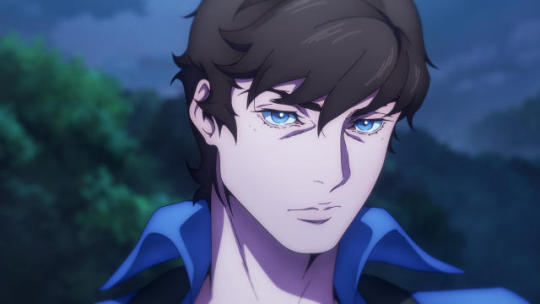
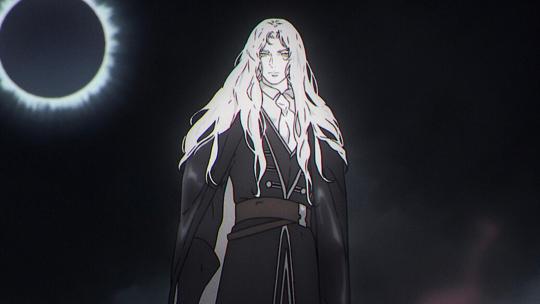
I’m hoping that as Nocturne continues, that there might be some eventual parallels between Alucard and Richter.
I’ve mentioned in another post I don’t really like Richter. I’m not going to reiterate the entire thing, but the long and short of it is I found his character unnecessarily mean-spirited. Some of his dialogue really rubbed me the wrong way and I didn’t find his lines all that funny. But it’s this specific line to Tera that sealed the deal with me disliking him.
“And you just happened to stumble upon it one day while you were out picking flowers?”
Um, what the fuck? She raised you, gave you a safe place to grow up, has been a surrogate mother to you, and has shown you nothing but kindness and support, and you’re going to talk to her like that? What an asshole.
And this is the difference between Richter and Trevor’s characters. Trevor is an asshole, but did he ever talk to Sypha or her grandfather this way? No. Did he talk to Alucard this way? Well…yeah, but also observe Alucard also woke up snarky and began insulting him from minute one, so we can argue they are delightfully matching each other’s energy with a vengeance.
But I’m not gonna lie…for the first two seasons, I also didn’t like Alucard’s character all that much and for the same reasons. I’m a little biased as I generally don't like protagonists who are just mean for no reason. We all know someone like that in real life, whether they’re a relative or a co-worker or a boss, so why deal with it in fiction? Okay yeah, I get that it’s often part of a character arc and symbolism for growth and finding maturity. I understand why storylines like this are necessary, but I’m still gonna hate the little shits for the duration they’re assholes.
So Alucard…the way he treats Trevor in the first two seasons is also pretty crappy behavior.
“I imagine one sacrifices a chicken, and divines the location of the book you want from the intestines. Maybe Belmont has a crystal ball in here you could ask. …. Your ancestors were apparently mentally ill hoarders. I fully expect to find family cats mummified under some of these shelves. Unless your family preferred to eat them.”
You’re gonna talk to your comrade like that…in his own home…where his entire family was brutally slaughtered by a mob....possibly right in front of him? Yeah, real charming, Alucard. And this is the tone for his character in the beginning. There is the point where Sypha calls him out and tells him to stop testing Trevor, but I think there’s another element at play. “…and he’s a drunk and he’s self-destructive and anyone trying to hold on to him may as well be dragged down with him.” He isn’t just testing him, he’s judging him and he’s already decided he’s a useless drunk who got lucky and happened to win a few fights.
All right, now that I’ve dragged him through the mud, I’m going to pull back and assess the wider perspective of Alucard’s full character arc. Alucard’s growth follows the line of the spoiled brat who experienced hardship and had to grow up because of it. I think Alucard lived a very sheltered life before his mother died, and his actions and dialogue in the Belmont Hold are the strongest indicator to this. We clearly see he’s disgusted by the trophies and the history of murder against the vampires, and he is not shy about voicing his contempt towards the family’s entire purpose. He’s right, though. With the presence of the infant skull in the display case, we do get the very subtle nod that the Belmonts, for all their claims of virtue and protecting humanity, have also committed atrocities. He does have a right to his anger against Trevor and his family.
But what’s absent from Alucard’s character here is the fact he doesn’t seem to consider the atrocities the vampires have committed against his mother’s people. To the vampires, humans are food, livestock, and a lesser species. Godbrand brutally murders several humans in his flashback with no clear intent on actually eating them, so he kills for sport. Cho torments the humans in her court by amusing herself with duels to the death that only she can win. Not a humane way to treat the vampire equivalent of livestock. And exactly how long does Erzsebet Báthory keep those girls chained up while she drains them of blood?
Why does Alucard condone what the vampires do to humans and at the same time condemns the Belmonts for hunting the vampires?
The answer: I don’t think he did because I don’t think he was fully aware of these scenarios. Think about it, he had no knowledge of Dracula’s Generals and the only thing he talked about regarding his father was the tragedy of his madness and how killing him would be destroying centuries of knowledge. I think Dracula wanted him to have a peaceful life and fed him the more rosy-colored version of their history. Maybe he intended to tell him one day, and that day kept being put off by the sentiment, “He’s a boy. Let him continue to be a boy.”
Alucard lives his peaceful childhood until it comes to a screeching halt when Lisa is killed, so I honestly think there is an innocence behind his upbringing that gave him a very clear bias against the Belmonts that was completely justified in some elements and not so much in others. There’s also the point that he keeps referencing Trevor as a drunk, which is very much condescension. It’s not until Season 3, after he’s experienced his traumas and has fallen into his own slump of grief that his attitude towards Trevor changes. There’s still ribbing between the pair, but it’s not the same cutting remarks that we saw back in Season 2. Alucard walked a mile in Trevor’s shoes, and that mile was bitter.
...
So where I stand with Nocturne: Richter has started off in a way similar to Alucard. He lost his mother at a young age, but aside from that, he grew up safe and loved in a stable home, has a good relationship with Tera and Maria, and has otherwise led a relatively peaceful life. Even in the midst of the French Revolution, they don't seem like suffering peasants. Like Alucard before his world truly went to hell, Richter also didn’t have a full concept of what real hardship looks like. This is apparent when he’s all confidence and bravado, going around and yelling he’s the ‘last of the Belmonts’ and he ‘kills vampires’ and “Who’s next?” And then Olrox shows up and he cows him right back into the scared, little boy he’s pretending he’s not.
And so not only is there a parallel between Richter and Alucard, but there is also a big one between Trevor and Annette. Both of them have suffered through their own individual hardships, both losing their loved ones in some of the most brutal ways imaginable, but those same hardships gave them their pride and their poignant maturity and cynicism in how they see the world. Granted, the difference between Trevor and Annette is she never lost her purpose or her will to fight despite having been dealt the worse lot of having been born a slave, but still…Trevor never ran away from his nightmares like Richter did. Even though Annette and Trevor have their moments when they are scared, both of them stood up and said, “Fuck it, I have a bastard to kill and if I die killing them, so be it.” They don’t give an absolute damn. They took their pain and they wore it like armor.
“Killing you was the point. Living was a luxury.”
“If I let my past terrify me, I’d never be free of it.”
…
Compared to them, Richter is a spoiled brat who has yet to grow up.
And I think Alucard’s going to be right there with him saying, “Don’t worry. I was like you once and we’ll get there together.”
#castlevania#richter belmont#alucard tepes#trevor belmont#annette#castlevania netflix#castlevania nocturne#parallels#character analysis#character development
59 notes
·
View notes
Text
About Oktavia von Seckendorff

There's a lot to say about Oktavia (personally I'd say it's the easiest to find interesting stuff about her out of all the witches) but here's some stuff I've been thinking about.
(I'm aware that most of this has probably already been pointed out by someone at some point, I just want to ramble)
Her name
Oktavia is more obvious. Oktavia -> Octavia (latin, "the eighth"). In music an octave is an interval of eight whole tones (it's the same note in a different pitch, I don't know if people who don't care about music know this stuff).
Sayaka and Oktavia are both music themed I don't have to explain the connection, but I also find it interesting to note that Oktavia's first appearance is in the eight episode of the anime.
The interesting part is von Seckendorff, I know. Karl Siegmund von Seckendorff (26 November 1744 - 26 April 1785) was a German poet and composer (and military officer, which doesn't seem relevant right now but considering the knight elements in Oktavia's design that might have played into it?).
I'll be completely honest, he has very few creations and I cannot get access to any of them (he really was not relevant enough, I suppose) but Wikipedia lists one of his works as Das Rad des Schicksals, oder die Geschichte des Thoangesis, which directly translates to the wheel of fate, or the story of the Thoangesis(??). I do not know what is in that text, I can't even get an e-book of it. However, the title alone reminds me of the many wheels in Oktavia's labyrinth and other depictions of her.
This is going to sound like I'm reaching but the name von Seckendorff can also be connected to Kriemhild Gretchen (Madoka's witch). Karl Siegmund von Seckendorff found inspiration in Johann Wolfgang von Goethe, translated one of his novels and composed music for some of his poems. Goethe's Faust seems to inspire aspects of Kriemhild Gretchen, and considering the inherent connection between Sayaka and Madoka I feel like this is worth mentioning. (I might elaborate on this separately but the basic connection between Madoka and Goethe's Faust is: girl named Magarete loses her innocence/purity and becomes trapped and destroyed — from that point on is referred to as Gretchen. Being a witch is loosing your innocence freedom etc, being a witch turns Madoka into ((Kriemhild)) Gretchen.)
Von Seckendorff was never really successful when pursuing the arts, by the way. (I mean, people barely know him.) There's something to be said about Sayaka's whole story, about her being destined to always turn into a witch and never "succeed".
Her design
Most people are somewhat aware of the whole little mermaid thing, but I'll mention it again just in case. Sayaka's story greatly resembles that of the little mermaid (not Disney), which could explain Oktavia being referred to as the mermaid witch (and literally being a mermaid, she has a tail) as well as the general water/ocean theme both her and Sayaka have. You can read it yourself if you're interested, but long story short the little mermaid wants a human soul and a prince's love and exchanges her tongue (yeah) for legs with a sea witch so she can be on the surface, though she can't speak. (So still similar to the Disney version) The Prince does not fall for her, she dies of a broken heart and jumps into the sea, dissolving into sea foam.
The mermaid makes a great sacrifice for her wish and the love she desires and ends up not gaining anything from it, instead loosing her life as her soul withers away in the sea. Very Sayaka.
Okay this one seems weird but I thought of it when rewatching the series again.
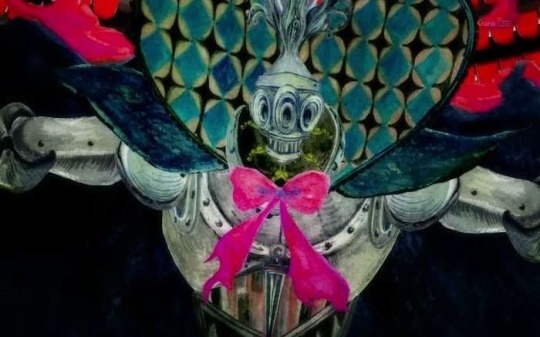
In the first episode Junko (Madoka's mother) notes that pink ribbons will attract affection/attraction from men. Sayaka only became a magical girl in the first place because she desired Kyōsuke's love (and Octavia is destined to appear in every timeline that Sayaka makes a pact with Kyubey in, so you could argue that the desire for love is a direct reason for Octavia's existence.) (Oktavia is stated to be all about love/falling in love so I guess that's canon.)
I think the ribbon could just be there because of the school uniform, but I don't think that's the case (or at least not the only case. Design choices can have several inspirations) When witches take inspiration from their respective magical girl's designs it's usually about the actual magical girl clothes and not casual/school clothes. So yeah, I like to think it's meant to represent Oktavia's desire to love and be loved.
There's probably a lot more to say about her but these are some of my thoughts :3
#text post#oktavia von seckendorff#miki sayaka#sayaka miki#analysis#interpretation#puella magi madoka magica#my rambles
55 notes
·
View notes
Text
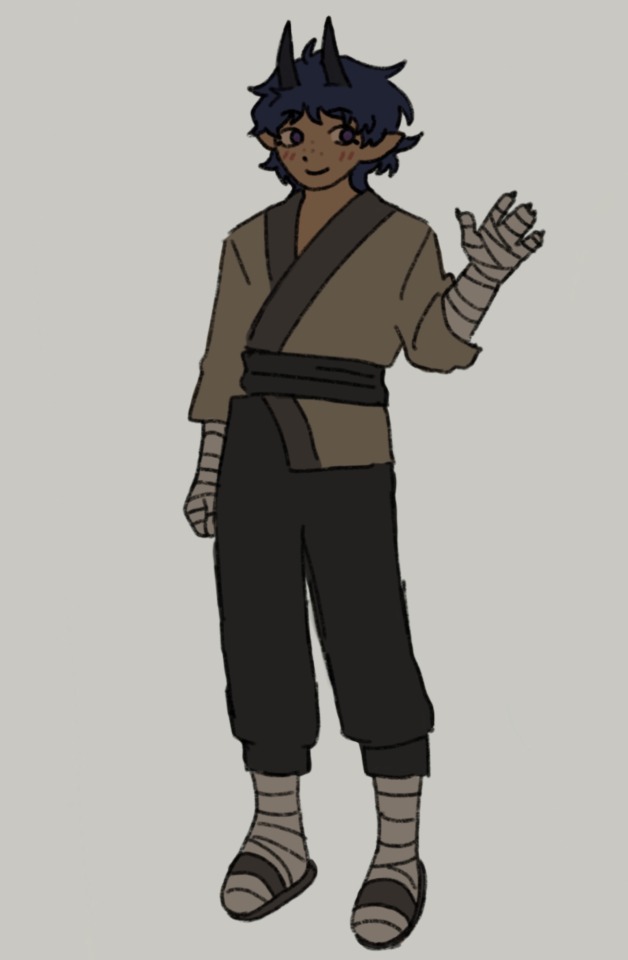
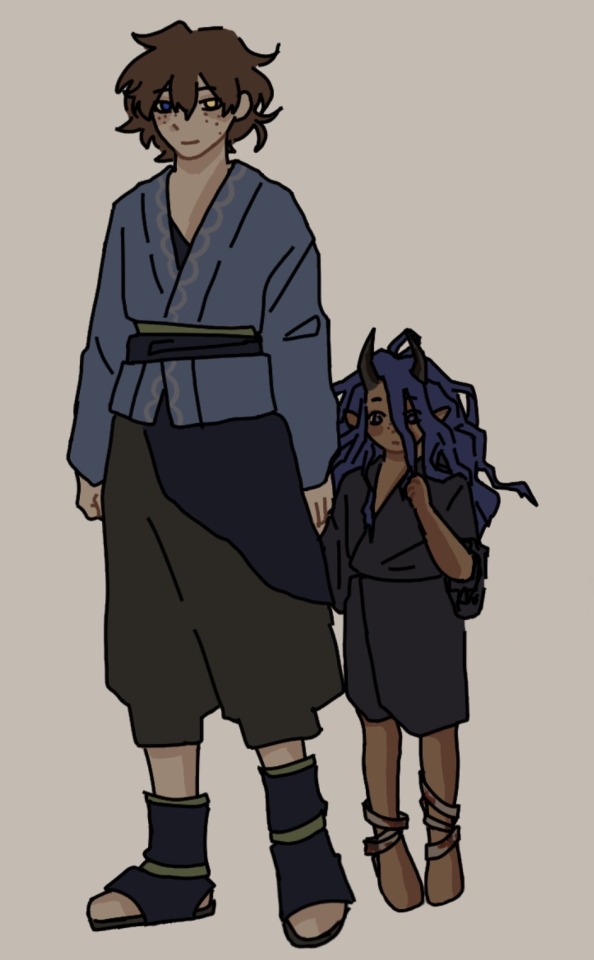
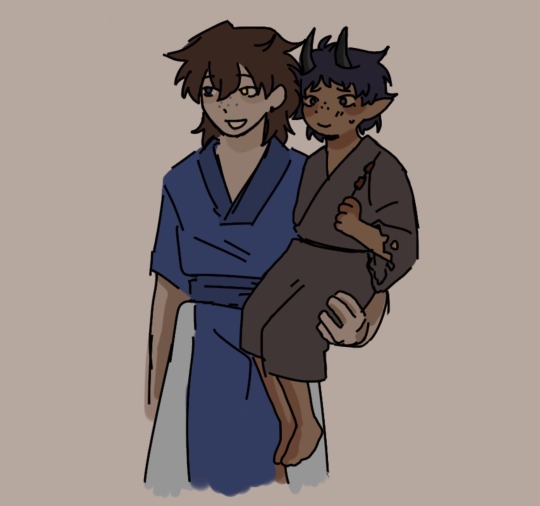


ninjago OC !
been seeing a lot of dad! jay so i wanted to share my take on it :) lore is under the cut !!
TW abuse ! ALSO i am no means a writer and i’m definitely illiterate and this is my first time ever writing my ocs lore down (usually i keep it in my brain) so i hope it’s easy to understand 🥲 anywho
Ino is from the kingdom of wildness and is an oni. in oni cultural the runt of the litter is used to do all their dirty work, Ino being the weakest and youngest of his ‘family’ is abused, and treated like a slave.
when jay finds him he is malnourished and neglected, his hair is long and tangled, he has bruises and cuts on his face and old unclean bandages wrapped around his body. The oni have no use for ino, despite him doing all the chores around his house so jay buys him off of them.
it basically goes like this lol
jay- how much for the kid.
oni - ?????? bruh idk like 3 bucks
jay- k. *takes ino and leaves*
after the merge,Jay had taken refuge on a small inhabited island with a few other people from ninjago, they create a village, and are living quite nicely despite them living in a new world. Jay takes Ino to his home and get him cleaned up, but not a single time had ino said a word to jay, did they speak the same language? had he been so scared that he wouldn’t say anything? well it was both. Ino is in-fact, scared and can only speak the old tongue of the oni. Never in his life had he meet a human before, well besides that one fiery girl with red hair, who’s dragon attempted to eat him. but he didn’t count her, she was…. interesting. He did not speak their human language and he looked so different from him so why did the man in blue take him in? but that didn’t matter anymore, Jay had washed him up, gave him fresh clothing, cut his overgrown hair and nails as well as give him a name, a home, and most importantly, a family.
time skip a few years (it can vary depending on how long you think the merge timeskip was)
as time goes by jay teaches ino how to fight and how to maintain his oni powers, along the line he learns spinjitzu. a few years later when jay is corrupted by the kingdom of madness, he loses his memories and joins the administration, unknowingly jay passes his elemental power down to ino as way of saying goodbye.
and that’s kinda what i have lolz, somewhere along the line sora and arin see him doing spinjitzu and are like WOAHHH join our ninja team!!! but he doesn’t cause he’s awkward and wants to keep the jay situation a secret.
some facts! ~~
- ino is quite smart and it did not take him long to learn the ninjago language
- Despite being oni he mostly stays in his human form for fear of being judge
- i draw him with horns, but he canonically doesn’t have them unless his emotions get the best of him and struggles to keep his human appearance
- when he was younger jay had told him many stories about lloyd and wu as his way of saying “well not all oni are bad”, he even mentions mystake but leaves the part of him being drugged by her(season 8)
- jay had given him the name Ino, he saw somewhere that it meant storm and was like COOL but he wasnt aware that it also meant bad
- when ino talks about jay he refers to him as his father or dad, but never actually calls him that (jay has no problem referring to ino as his son)
- before the merge, when ino was younger, he used to play with wildfyre and even prank the lava-tides together, but their friendship didn’t last very long due to the onis and dragons hating eachother ( heatwave wouldn’t let wildfyre play)
- ino meets arin sora and wildfyre in a random village, they get to know each other but later that night the village is attacked by a strange monster. ino loses control of himself when he sees his new friends get hurt and loses control of his oni self.
#kunshoart#dad jay au#lego ninjago#ninjago#ninjago dragons rising#ninjago jay#suit jay#ninjago ino#cringe not me tagging my oc#oc art#oc#ninjago wildfyre#kunsho#kunsho oc
138 notes
·
View notes
Text
(Il y a une version française juste en dessous: Bonne lecture !)
UNDERVERSE THEORY:
Have you noticed it too?

That soul, there...

TheeeeeEEEEre !
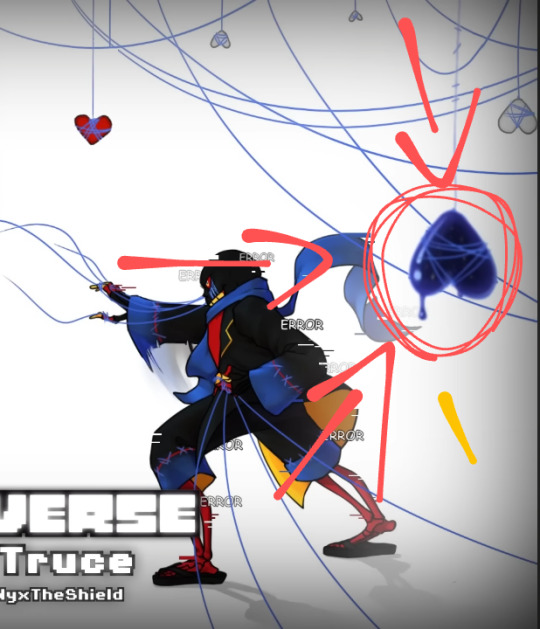
Have you ever wondered who it might belong to?
When I was listening to the song "Broken Truce", my eyes glided over this soul without lingering on it. I told myself it was just a slightly strange heart like so many others you find with the different OC's the Creators come up with... But the day my brain finally twiged that it wasn't normal, it made me wonder...
Huh, that's strange... A weird soul covered in black in an image illustrating a song in a web series that has a habit of playing on words and images to imply clues... shown directly in the foreground, blurred what's more, interesting, isn't it? I've checked the series and I've never found in Error's cables any souls other than the normal ones; monster souls and red Determination souls. Not even human souls like Kindness, Patience, Justice, etc. Jakei is a person who pays attention to detail. Given that she animates her series on her own and that it's a mammoth task, she's got into the habit of not cluttering up her plans with unnecessary details. So why would she stick a random soul in there?
That's when I said to myself: no. This soul has a meaning. But whose could it be? And why would it be in Error's possession?
There are lots of characters whose souls are gloomy and a bit odd... Error, X-Gaster, Fatal Error, Fresh, Nightmare...
Firstly, even if it looks like one, it can't be Nightmare's because his soul is an apple. Anyway, Error's cables have no effect on him, and then, well... It simply wouldn't make any sense or be of any interest to the story.
Error's then? After all, he's a corrupt being in a way, and we're talking about an appearance in a song about his relationship with Ink. But even if he had one... It would be glitchy and certainly not that different from basic monster souls. Same goes for Fatal.
Gaster has his soul in his possession and it doesn't look like that anyway...
Fresh, his soul is directly the parasite...
Gee, who could that be?
Ink 🤔?
No, I'm such an idiot! It can't be Ink's soul because Ink has no soul ^^ !
...
Wait...
INK HAS NO SOUL (┛◉Д◉)┛彡┻━┻ !!!!!!
Here's my theory: the soul in Error's threads is Ink's soul. Let's look at it: it's covered in a kind of blackish liquid with bluish tints. Black liquid is often associated with hatred or suffering. And if not, it's simply covered with ink. And blue, whether in general or in Underverse 0.7's context, is associated with sadness. So: sadness and suffering, in a concentration so strong that it had an impact on the very appearance of the soul... The emotions Ink must have been feeling when he was stripped of his essence! Ink suffers from severe denial in relation to the emotion represented by the blue, since it's the only one that's always full, so it coincides. And whose soul would it be otherwise? Why would Jakei have drawn it in THIS video specifically? A song about Ink and Error? Why in the foreground, showing that it's important, and blurred, showing that it's a hidden element that will be revealed in the near future?
And why would the soul have ended up in Error's threads? It's not hard to imagine, Error has a whole gallery of souls in his Anti-Void. He'd clearly be able to wander into an empty AU at random and find it on the floor, going, "Oh, that's a pretty one, why don't I add it to my collection?"
But what I like most about this theory is everything it would involve:
It would mean that Ink could get his soul back at the end of Underverse, bringing to a close his character development. See him finally come to terms with his feelings and get his soul back so that he can feel for himself, freely, accepting what that involve and facing once and for all the suffering he has ostensibly been running away from...
It would mean that finally, there's a reason why Ink live even without a soul in his body, because well, that's something I've always wondered about his character! His soul has been extracted from his body, but his body is still moving, and lives only on the emotions provided by the ink in his vials, like Kris in Deltarune when he rips out his soul.
It would mean that, come on, he might be able to recover a viable memory?
And above all... It would mean that Error had the opprtunity to kill Ink for good FROM THE BEGINNING and that he was incapable of doing it just because he didn't know it was his 🤣 !!!! And THAT is handsome!
Error at this moment:


An hilarious polt twist–
Unless he'd simply forgotten he had it, which is... Clearly possible coming from Error.
The only problem with this theory is that, in Ink's comic, he doesn't just rip it off his body... He's tearing it apart. The soul completely crumbles to dust. So canonically speaking, it's impossible.
That said, it's a detail that can easily be overlooked if you're keen to incorporate the idea into a story, especially as Underverse never set out to make complete canon.
So why not?
In any case, if this theory is wrong in Underverse, I think it's still a great Headcanon ^^
__________________
THÉORIE UNDERVERSE :
Vous aussi vous l'avez remarquée ?
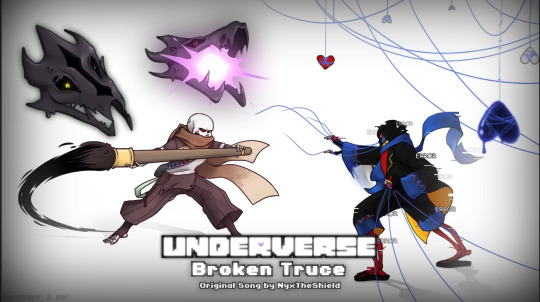
Cette âme, là...

LÀ !
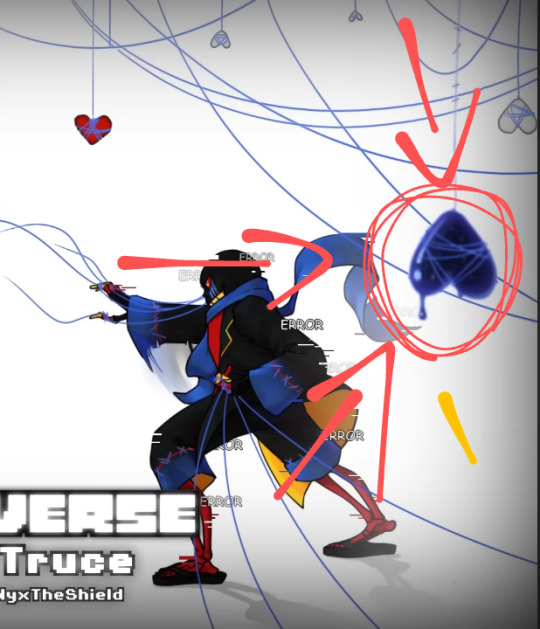
Vous ne vous êtes jamais demandé a qui elle pouvait appartenir ?
Quand j'écoutais la chanson "Broken Truce" mon regard avait glissé sur cette âme sans m'y attarder. Je me disais que c'était juste un cœur un peu bizarre comme tant d'autres qu'on trouve avec les différents OC's qu'imaginent les Créateurs... Mais le jour où mon cerveau à enfin tilté que c'était pas normal, elle m'a beaucoup interrogée...
Primo : tiens, c'est bizarre... Une âme étrange recouverte de noir dans une image illustrant une chanson dans une websérie qui a l'habitude de jouer sur les mots et les images pour sous-entendre des indices... montrée direct au premier plan, floue qui plus est, intéressant, non ?
Segundo : j'ai vérifié dans la série et je n'ai jamais trouvé dans les fils d'Error d'autres âmes que les normales, des âmes de monstres et des âmes rouge de Détermination. Même pas des âmes d'humain comme Gentillesse, Patience, Justice, etc.
Tertio : Jakei est une personne qui fait attention aux détails. Étant donnée qu'elle anime toute seule sa série et que c'est un travail de titan, elle a pris l'habitude de ne pas encombrer ses plans de détails inutiles. Alors pourquoi elle fouterait une âme bizarre LÀ ?
C'est là que je me suis dit : non. Cette âme a un sens. Mais à qui pourrait-elle être ? Et pourquoi serait-elle en possession d'Error ?
Il existe plein de personnages dont l'âme est sombre et un peu bizarre... Error, X-Gaster, Fatal!Error, Fresh, Nightmare...
Premièrement, même si elle y ressemble, ça ne peut pas être celle de Nightmare vu que son âme est une pomme. De toute manière les câbles d'Error n'ont aucun effet sur lui, et puis surtout bah... Ça n'aurait aucun sens ni aucun intérêt scénaristique qu'elle serait là.
L'âme d'Error alors ? Après tout c'est un être corrompu d'un certain côté, et puis on parle tout de même d'une apparition dans une chanson parlant de sa relation avec Ink. Mais en admettant qu'il en aie une... Elle serait glitchée et très certainement pas si différente des âmes de monstres basique. Pareil pour Fatal.
X-Gaster a son âme en sa possession et de toute manière elle ne ressemble pas à ça...
Fresh, son âme est directement le parasite...
Mince, qui ça peut être ?
Ink 🤔?
Bah nan, qu'elle idiote je fais ! Ça peut pas être l'âme de Ink vu que Ink n'a pas d'âme ^^ !
...
Wait...
INK N'A PAS D'ÂME (┛◉Д◉)┛彡┻━┻ !!!!
Voilà ma théorie : l'âme qui est dans les fils d'Error est celle de Ink. Observons la : elle est couverte d'une sorte de liquide noirâtre aux reflets bleuté. Le liquide noir est très souvent associé à la haine, ou la souffrance. Et sinon, à l'encre tout simplement. Tandis que le bleu, que ce soit de manière générale ou dans Underverse 0.7, est plutôt associé à la tristesse. Tristesse et souffrance, en un concentré tellement fort que ça a eu un impact sur l'apparence même de l'âme. À savoir les émotions que devait ressentir Ink au moment où il s'est destitué de son essence... Ink qui souffre d'un gros déni par rapport à cette émotion représentée par le bleu vu que c'est la seule qui est toujours pleine, donc ça coïncide. Et à qui serait cette âme sinon ? Pourquoi Jakei l'aurait-elle dessinée dans CETTE vidéo spécifiquement ? Une chanson qui parle justement de Ink et d'Error ? Pourquoi en premier plan, montrant que cela a de l'importance, et floutée, montrant que c'est un élément caché qui sera révélé dans un futur proche ?
Pourquoi l'âme se serait retrouvée dans les fils d'Error ? Pas compliqué à imaginer, Error possède une galerie entière d'âmes dans son Anti-Void. Il serait clairement capable de se balader dans un AU vide au hasard et la trouver par terre en mode : «Oh, tiens, elle est jolie celle-là, et si je l'ajoutais à ma collection ?»
Mais ce qui me plaît le plus avec cette théorie, c'est tout ce que cela impliquerait :
Ça voudrait dire que Ink pourrait récupérer son âme à la fin de la série, concluant en beauté son développement de personnage qui le poussait à assumer enfin ses sentiments et récupérer son âme pour ressentir par lui-même, librement, en acceptant ce que ça implique et en affrontant une bonne fois pour toute la souffrance qu'il a ostensiblement fuie...
Ça voudrait dire que finalement, il y a une raison pour laquelle Ink est encore vivant même sans âme dans son enveloppe corporelle, parce que bon, c'est quand même quelque chose que je me suis toujours demandée sur son personnage ! Il a son âme extraite de son corps mais son corps est encore en mouvement, et ne vit que par les émotions procurées par l'encre de ses fioles. Ça s'est déjà vu dans des éléments canons, quand Kris de Deltarune il s'arrache l'âme.
Ça voudrait dire que, allez, si ça se trouve, il pourrait récupérer une mémoire viable ?
Et surtout... Ça voudrait dire qu'Error avait DEPUIS LE DÉBUT l'occasion de tuer Ink pour de bon et qu'il était pas fichu de le faire parce qu'il était pas au courant que c'était la sienne 🤣 !!! Et ÇA, c'est trop fort !
Error :


Un retournement de situation hilarant xD
À moins qu'il aurait tout simplement oublié qu'il l'avait en sa possession, ce qui est clairement possible venant d'Error.
Le seul problème qui vient à l'encontre de cette théorie, c'est que dans le Comic de Ink, il ne fait pas que se l'arracher à son corps... Il se la déchire. L'âme tombe complètement en poussière. Donc canoniquement parlant, c'est impossible.
Cela dit, c'est un détail qui peut être facilement négligé si on a envie d'intégrer cette idée à une histoire, surtout qu'Underverse n'a jamais eu la prétention de faire du canon complet.
Donc après tout pourquoi pas ?
Dans tous les cas, si cette théorie est fausse dans Underverse, je trouve que ça reste un super Headcanon ^^
Ink belongs to @comyet
Error!Sans belongs to @loverofpiggies
Underverse belongs to @jakei95
"Broken Truce" belongs to @nyxtheshield
#theory#underverse#ink sans#error sans#undertale au#text post#inktale#Underverse serie#Broken truce#Jakei#nyxtheshield#theweirdsoulinbrokentrucesong#soul#theory underverse#errorink#errorink relationship#Ilovetheirrivalshipsohardly
47 notes
·
View notes